

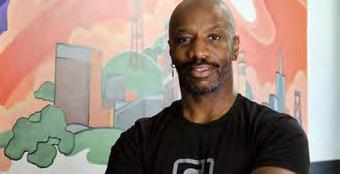

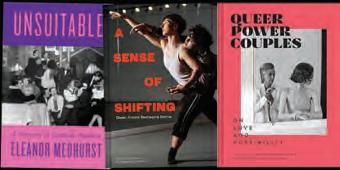
Judge says gay Oakland murder case can move forward
by John Ferrannini
Testimony from a homicide detective and DNA expert in the preliminary hearing of a UC Berkeley employee charged in the killing of a gay Black man in Oakland last year was compelling enough for an Alameda County judge to rule the case can move forward to trial.

Superior Court Judge Rhonda Burgess ruled June 18 that the prosecution’s evidence was compelling enough after two days of hearing from witnesses for the prosecution in Department 11 of the Rene C. Davidson Alameda County Courthouse near Oakland’s Lake Merritt. The defendant, Sweven Waterman, 39, of Oakland, will have the opportunity to enter a plea to the homicide charges again July 3 (he had already pleaded not guilty last year). He is still being held in custody at Santa Rita Jail in Dublin. Prosecutors accuse Waterman of killing Curtis Marsh, 53, also of Oakland. Marsh, who was also known as drag artist Touri Monroe, was a hair stylist and a Miss Gay Oakland emeritus who used to sing with the Oakland Gay Men’s Chorus. Originally from Iowa, friends described him as fun, helpful, and active in his church. (Waterman is on leave from his UC job.)
Waterman’s defense attorney David Briggs has told the B.A.R. in past reports that Waterman did not know Marsh, as far as he knew. Neither side is contesting that Marsh was killed at his apartment on Vernon Street in the Adams Point neighborhood just before 8 a.m. March 4, 2023.
Alameda County Deputy District Attorney Jake O’Malley conceded that “we may never know what events transpired in that apartment.” Nevertheless, he alleges that “for the purposes of today … the defendant was in that apartment when Curtis was killed, and his DNA is on the weapon.”
Testimony
Three people testified at the preliminary hearing, two on June 17 and one on June 18. All were called by the prosecution.
The first to testify was Ariel Butler, one of the Oakland police officers who responded to Marsh’s home the morning of March 4. The Oakland Fire Department was on the scene already, he said. (Neighbors had told KTVU-TV last year that the perpetrator set a fire and left the front door and gate open when running away.)
Butler said he’d spoken to a neighbor who “said there’d been multiple domestic violence incidents” in the past at the address. (Hearsay evidence is allowed at preliminary hearings.)
See page 2 >>

SF Pride hears it from
sides in Israel-Hamas conflict
by John Ferrannini
Strong feelings on both sides of the IsraelHamas war have landed the San Francisco LGBT Pride Celebration Committee in the middle, seemingly not pleasing anyone. The dueling positions come as San Francisco prepares to celebrate LGBTQ Pride June 29-30.
The Jewish Community Relations Council Bay Area criticized SF Pride in an email blast earlier this month, critiquing a “poorly worded statement” that the organization first published to Instagram. A proPalestinian group has also railed against SF Pride.
This year’s Pride parade is scheduled for Sunday, June 30, at 10:30 a.m., where thousands are scheduled to march up Market Street from Beale Street in commemoration of the 55th anniversary of the Stonewall riots, which is widely credited with launching the modern LGBTQ rights movement in the United States.
The parade this year is taking place against the backdrop of Israel’s war in the Gaza Strip, which started after Hamas, which governs the strip, killed 1,200 people last October 7 in the worst massacre of Jews since the Holocaust. Hamas since then has been holding Israelis hostage in Gaza.
Israel responded with an extensive bombing campaign in Gaza, and a ground invasion, which has led to the deaths of over 37,000 Palestinians, ac-
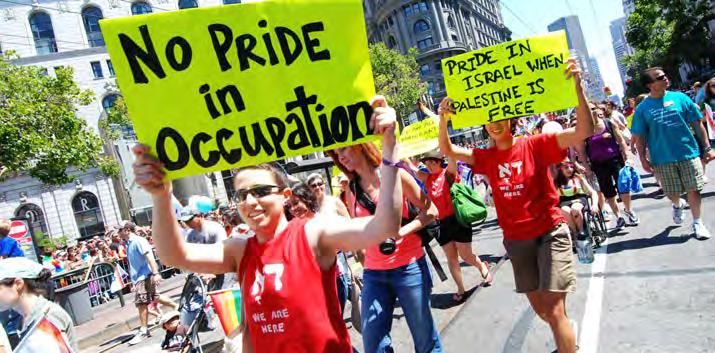
cording to health authorities, Reuters reports .
The U.S. provides billions of dollars in military aid to Israel annually. The Biden administration has faced pressure from some Democrats and protesters to cut off that aid, or make it conditional on a ceasefire.
Meanwhile, the United Nations Independent International Commission of Inquiry determined both the Israeli government and Hamas have committed war crimes, and the International Criminal Court issued arrest warrants for the leaders of both Israel and Hamas. Biden denounced the ICC warrant for Israeli Prime Minister Benjamin Netanyahu as “outrageous.” (This is separate from South Africa’s case in the International Court of Justice alleging that Israel is committing a genocide in the Gaza Strip.)
See page 12 >>
5th annual People’s March is ready to rumble in SF
by Eric Burkett
After four years of providing an alternative event to San Francisco’s Pride’s massive annual parade and celebration, the fifth annual People’s March will take place one week earlier on Sunday, June 23, ahead of SF Pride’s June 30 event.
The pre-march rally will begin at 11 a.m. at the corner of Polk and Washington streets in the Polk Gulch neighborhood, with the parade following immediately after, marching south on Polk Street to Sutter Street. Once there, celebrants can enjoy a music festival from 12:30 to 4 p.m., followed by an inaugural drag contest with cash prizes from 4 to 7 at Music City, 1353 Bush Street. The lineup for the music festival has not yet been announced.
Founded in 2020 in the wake of national protests following the murder by police of Black Minnesotan George Floyd, the first People’s March was, for many, a replacement for the annual San Francisco Pride parade. The in-person event that year had been canceled – replaced with virtual offerings – because of the COVID pandemic.
The People’s March also was seen by many as a return to Pride’s roots in protest.
The march was planned to follow the route of that first “gay-in” in 1970, which later grew to become the San Francisco Pride parade.
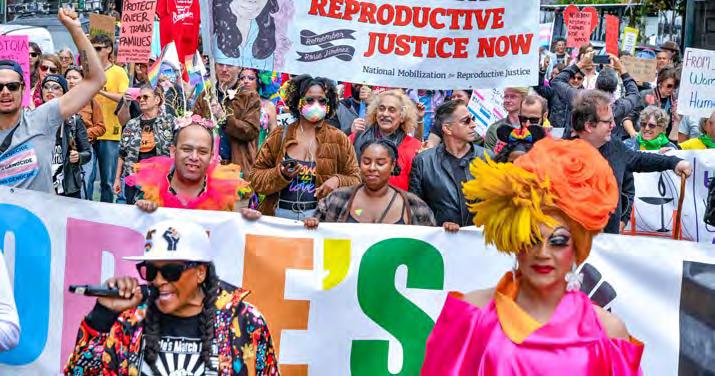
Organized by Juanita MORE! and Alex U. Inn as a more activist-focused event than its larger counterpart, the People’s March had been a longtime dream, Inn told the Bay Area Reporter that first year. A former board member of the San Francisco LGBT Pride Celebration Committee, Inn had been critical of what they felt was the
more assimilationist direction that the parade had taken.
The move this year to the earlier time slot will help participants already facing a packed Pride schedule, said MORE! See page 13 >>
Serving the lesbian, gay, bisexual, transgender, and queer communities since 1971 www.ebar.com Vol. 54 • No. 25 • June 20-26, 2024 Pride Booksapalooza ARTS 15 15 ARTS New fitness centers open 08 03 The Race to finish construction Vote now in our 2024 readers’ poll choosing the best people, places and things to do in the San Francisco Bay Area and you could feather your nest with a $500 cash prize. www.surveymonkey.com/r/BESTIES2024 Help me find the Best of the Bay! Frameline 48
both
Activists opposing the Israeli occupation of Palestine marched in the 2009 San Francisco LGBT Pride parade.
Rick Gerharter
Alex U. Inn, left, and Juanita MORE! led the 2023 People’s March.
Gooch
Curtis Marsh was killed in March 2023.
Oakland LGBTQ center
Friends, family remember Michelle Henry at funeral
by Max Guerrera
Michelle Henry, the San Francisco transgender woman who was killed last month, was remembered as a kind and outgoing pillar of the trans community at a funeral service June 15. The service was held at the Episcopal Church of Saint John the Evangelist, where friends and family spoke about Henry’s life and grieved her tragic death.
“She was going to change the world and now she cannot change it, and she’s being unfairly justified by having the person who took her life walk the streets of San Francisco,” said Winston “Neo” Henry, Michelle Henry’s uncle.
Michelle Henry, 25, lived in San Francisco for the last three years of her life before she was tragically killed May 15. As the Bay Area Reporter previously reported, according to the San Francisco Police Department, officers responded to a residence on the 700 block of Post
From page 1
Homicide Detective Kyle Cardana was the next one to testify. Cardana said when he arrived he saw Marsh’s body with stab wounds on the balcony of the apartment, as well as a “bent knife on the ground.”
Street after receiving a report there was a physical altercation between two people. Officers arrived and found Henry lying on the ground with stab wounds, according to SFPD.
Police did arrest a person, Raymani Yuhashi, and they were booked into San Francisco County Jail on the charge of the unlawful killing of a human being. Yuhashi was later released and no charges have been filed. The San Francisco District Attorney’s office continues to investigate the case. A DA spokesperson did not respond to the B.A.R.’s request for comment.
Michelle Henry’s family allowed a B.A.R. reporter to attend part of last weekend’s funeral service. She called the Transgender District home and had moved into her new apartment there just a month before her death, according to her uncle.
Veronica Nikita Pritipaul, a close friend, recalled, “She moved here to
“At first glance ... there may have been some blood on the knife,” he recalled.
Cardana said that when he walked into the apartment it was “covered in an inch or two inches of water” due to overhead sprinklers, which were no longer on at the time he entered the apartment, though there was still a small fire “near a bar stool.”
San Francisco to start her new life, and I think a lot of us resonate with that.”
Despite their tragic loss, Michelle Henry’s loved ones emphasized the importance of honoring and remembering her life and the impact she made on their own.
“Michelle connected so many people, and I think it’s important to mourn her loss as a lesbian, and as a trans lesbian. I think it’s really easy when Black trans women die to create these narratives about her in our head about the life that she lived, but really she was giving back so much to her community, and she was deeply involved in lesbian spaces. That was a really core part of her identity,” said Pritipaul.
Michelle Henry volunteered her time and energy toward fostering a sisterhood where trans women of color could feel loved and supported, friends said.
“We met in What’s Tea, which is a trans people of color support group. She was sharing her story, and for us
Cardana said that, initially, Marsh’s male domestic partner, who the B.A.R. is not identifying because he did not testify at the preliminary hearing, was taken into custody. However, the partner showed text messages that proved he was at a friend’s house in Emeryville from about 7:15 in the morning until after the time of the killing. He has not been charged.
trans women of color, specifically trans lesbians of color, she was kind of like a bedrock part of our community,” said Pritipaul. “I was in my community because of her. Black trans women are the ones doing the work and fighting every day for our community. I don’t see people stepping up enough for Black trans women, and I’m gonna fight every day to make sure they get their flowers while they’re still here.”
Michelle Henry will be remembered as a welcoming friend, who was unafraid to take a stand for others, family members said.
“She was very bold. She was very straightforward, she would protect her friends, she would protect her community, and she would be there for anybody who needed her,” said her uncle, Winston “Neo” Henry. “The person who did this should be held responsible. They took away something that cannot be replaced.”t
“We believe the killing occurred between 7:30 and 7:52 hours in the morning,” Cardana said. The partner returned after hearing from another friend that Marsh was injured.
Cardana recalled that a neighbor told him that around 7:30 a.m. “she heard screaming, what appeared to be fighting, and saw Mr. Marsh scream, so she ran to get her cellphone to call 911.”
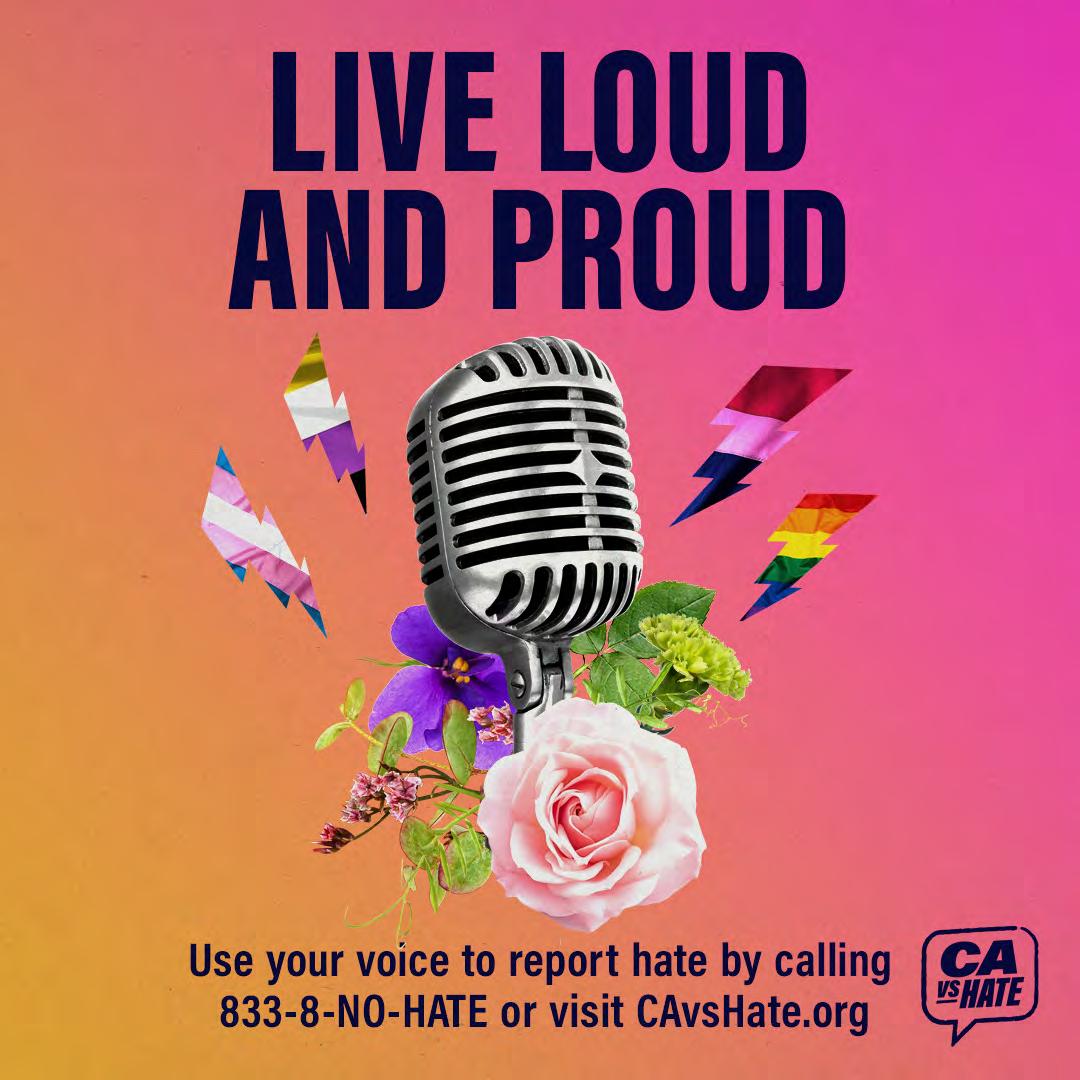
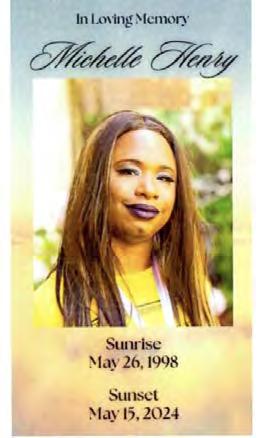
A funeral service was held in San Francisco June 15 for Michelle Henry.
Cardana said that as part of their investigation, police obtained a video showing a man arriving on a Lime scooter that morning after 5:17 a.m. The court viewed the video, and another taken after the time believed to be the time of the killing, showing a man leaving the apartment.
Police obtained a subpoena for financial records from Neutron Holdings Inc., which owns the scooters. It showed a scooter ride in Oakland that started at 5:10 a.m. March 4 and was updated after 5:17 as being paid for by Waterman, Cardana said. After being contacted by police, Waterman gave a swab of his saliva to Oakland police.
Cardana said that “we determined there were at least 1-2 people inside the apartment at the time of the attack.”
During cross-examination, Briggs asked, “so, is it possible there were three people in the apartment at the time [Marsh] was attacked?”
Answered Cardana, “That is unknown.”
“So it is possible,” Briggs asked.
“It could be, yes,” Cardana answered. Angela Freitas, a DNA evidence expert, testified June 18. She testified that Oakland police sent her office several samples, including four different swabs from the knife, as well as a swab of DNA from Waterman.
O’Malley asked what she’d discovered. There was DNA from four people on the knife, she said. One sample showed that it was 660 octillion times more likely DNA came from Waterman and three unknown individuals than if it was from four unknown individuals, she said
“For reference, an octillion has 27 zeros,” she added.
Other samples had similarly high probabilities of coming from Waterman, Freitas testified.
Briggs honed in on the fact that DNA from at least two other people, who were not Waterman or Marsh, was found on the knife, including one that Freitas determined to be from a male who could not be identified using the Combined DNA Index System, or CODIS, an FBI-run database of the DNA of convicted offenders, unsolved crime scene evidence, and missing persons. Briggs also had Freitas concede it is possible water damage could damage the reliability of the DNA evidence.
O’Malley had the chance to question Freitas again. She testified there is no way to know when DNA was left on any particular item.
“There are different ways a person’s DNA might end up on a knife,” she said. “I have received DNA evidence going back decades – to the 1970s. Those are the oldest DNA cases I have personally worked. I have colleagues whose DNA evidence has gone back further.”
This resource is supported in whole or in part by funding provided by the State of California, administered by the California State Library in partnership with the California Department of Social Services and the California Commission on Asian and Pacific Islander American Affairs as part of the Stop the Hate program. To report a hate incident or hate crime and get support, go to https://www.cavshate.org/.
Briggs conceded Burgess’ ruling as a foregone conclusion “given the low standard of preliminary hearings” –though he was sure to add that “there are a lot of unanswered questions in this case.” t
2 • Bay area reporter • June 20-26, 2024 t
<< Community News
<<
Murder case
Crews race to finish Market St. work by Pride
by Matthew S. Bajko
The Bay Area’s wet winter caused havoc on the construction schedule for the pedestrian safety enhancements being built along Market Street. It pushed the timeline for completing work on the main thoroughfare through San Francisco’s downtown further into the summer months.
It also meant that the project would run head-on into the city’s Pride weekend at the end of June. The annual LGBTQ celebration brings hundreds of thousands of spectators to Market Street between Beale and Eighth streets to watch the parade, taking place this year Sunday, June 30.
Now crews are racing to finish work on several components of what is known as the Better Market Street project ahead of the LGBTQ celebration. They have been given a deadline of Friday, June 28, to wrap up the construction already underway and clear out in order not to impact the parade.
Asked by the Bay Area Reporter about the ongoing construction project with Pride weekend fast approaching, San Francisco Public Works spokesperson Ben Peterson expressed confidence it would not interrupt the festivities. He noted the current work is focused solely on the sidewalks at several Market Street intersections and not on the lanes of traffic along the roadway.
“We are not currently performing any work on the roadway of Market Street, so there will be no impacts or obstacles to parade floats or others participating in the parade,” noted Peterson in an emailed reply June 17.
He added, “We’ve instructed our contractor to not start any new work that they don’t expect to be complete before the weekend of the 29th-30th to ensure that there are no exposed excavation areas during Pride festivities.”
Between now and then Peterson said the city agency will be working with the project’s contractor on condensing and cleaning up all construction areas along Market Street so there is plenty of sidewalk viewing space for Pride attendees and parade viewers.
“This includes removing all unneeded construction equipment and materials from the site, temporarily covering or erecting barricades around any open construction areas, and generally making sure there is no construction-related debris in the area. Our #1 goal is to make the area as clean, clear, and safe for all attendees,” stressed Peterson.
The first phase of the $60 million project was initially slated to wrap up this past winter. But a June 14 emailed update noted that additional work needed on the stretch of Market between Seventh Street and McAllister/Jones streets, as well as the “stormier than expected winter,” resulted in “a few unexpected delays to construction” so phase 1 construction is now expected “to be complete in late summer 2024.”
At the moment the bulk of the work is focused in the Mid-Market area between Fifth and Eighth streets. Granite curb installation, curb ramp construction, and sidewalk work are underway at the Market and 5th Street/Cyril Magnin intersection.
By the end of this week, sidewalk reconstruction should be finished at the southwest corner of Market and Fifth streets. Crews are then to install a new curb ramp and reconstruct part of the surrounding sidewalk at the northwest corner of Market and Cyril Magnin streets with the work
ahead of Pride weekend.
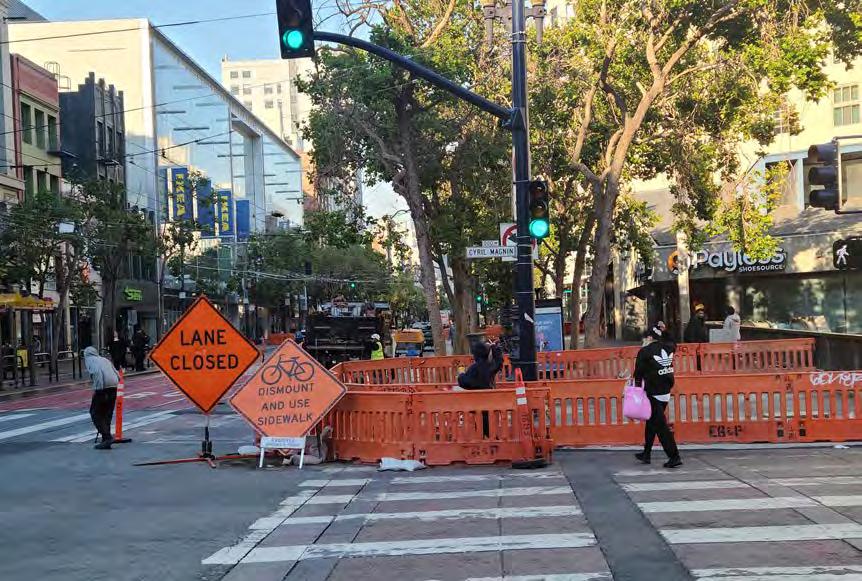
tion of new curb ramps, the installation of new granite curbs, and reconstruction of the gutter area and a portion of the sidewalk.
“At the same time, we will begin similar work at the northeast and northwest corners of the Market Street and 7th Street intersection. We expect this work to last through the middle of July,” noted the project team in its email.
Second
phase
The second phase of the Better Market Street project entails a new turn-back loop for the F Line historic streetcars along McAllister Street and Charles J Brenham Place. It will allow for more frequent trains along the route’s busiest stretch, between Union Square and Fisherman’s Wharf, according to the project team.
The historic trolleys’ southern terminus is in the city’s Castro district. It is a popular way for tourists staying downtown to travel to the LGBTQ neighborhood.
Construction on that part of the project isn’t slated to begin until late 2025 at the earliest. The timeline is dependent on the city securing funds for the work. t
includes the construc-
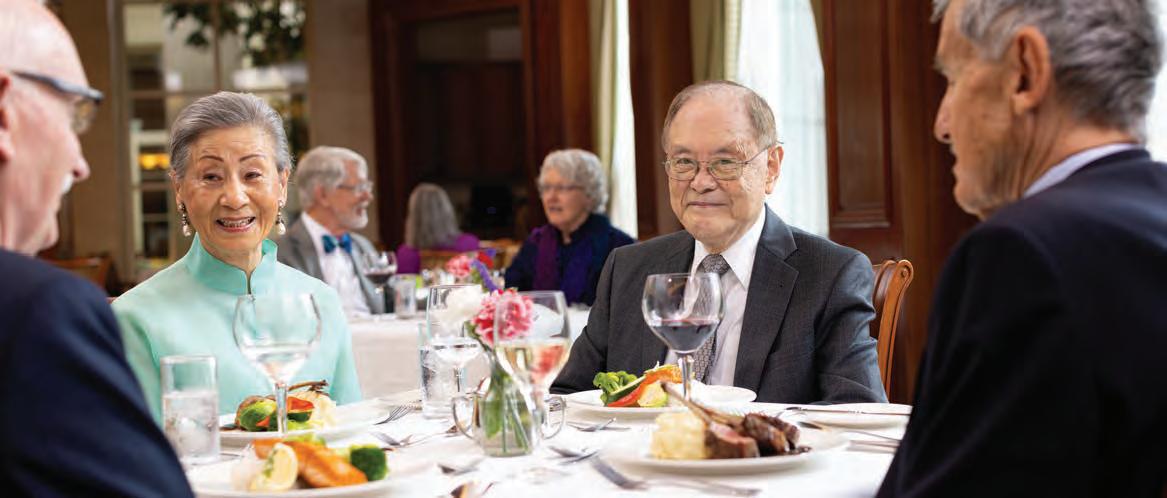
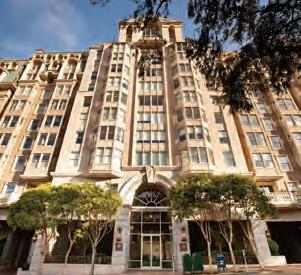
San Francisco Towers embodies the best qualities of our city. Welcoming, sophisticated and inclusive, it’s a place where you can be yourself and live among friends who share an appreciation for arts, culture and social activities. Well-appointed apartment homes with large windows offer stunning views of the city or the Bay. Schedule a tour and see what makes our Life Plan Community the top choice for discerning seniors.
about move-in incentives. Up to $5,000 credit toward moving costs* 415.447.5526 | SanFranciscoTowers.org 1661 Pine Street, San Francisco, CA
finished
Also set to wrap up by then is the curb and sidewalk work taking place at the southeast corner of Market and Fifth streets. New curb ramps
and pavers at the Market, Turk, and Mason streets intersection should also be completed by the end of this week.
The added work for the block of Market between Seventh and McAllister/Jones streets is focused on the north side. It
June 20-26, 2024 • Bay area reporter • 3 t Discover San Francisco’s SIGNATURE SENIOR LIVING.
INDEPENDENT LIVING I ASSISTED LIVING I MEMORY CARE I SKILLED NURSING I LIC# 380540292 / COA #350
Ask
*Restrictions apply. Limited time offers.
Pride
2024>>
Crews worked at the intersection of Fifth and Market streets Tuesday morning.
Cynthia Laird
Gay underdogs qualify for SF mayoral race
by Matthew S. Bajko
They lack the name recognition, fiscal resources, and political establishment support that the quintet of top tier San Francisco mayoral candidates have headed into the fall election. Nonetheless, two gay men have qualified for the November 5 ballot and hope to start receiving more attention to their candidacies.
Castro resident Keith Freedman is the owner of Hostwell, a company that manages and cleans short-term housing rentals in the city. Jon Soderstrom, who lives near the Panhandle of Golden Gate Park, is a former registered nurse and French language tour guide focused at the moment on his mayoral bid.
Both are first-time candidates for elective office. They are among the baker’s dozen of mayoral contenders who will appear on the city’s general election ballot.
“We started with 52 and ended up with 13, which is still a lot,” noted Freedman, referring to the number of people who had pulled papers for the mayor’s race but didn’t meet the qualifications to run by the June 7 deadline to do so.
While he understands he will be viewed as an underdog in the race, Freedman told the Bay Area Reporter he is a serious candidate.
“I intend to win,” he said.
Soderstrom also told the B.A.R. that he isn’t concerned about being tagged an underdog candidate.
“I am pretty comfortable with that,” he said. “Being an underdog is especially common in the tourism business, as your profit margin is incredibly tight.”
He said he knows his mayoral bid is an “insane long shot.” Nonetheless, even if he doesn’t win, Soderstrom wants to bring attention to various issues plagu-
ing the city with his candidacy.
“There isn’t just one part of San Francisco that needs fixing,” he said. “Law enforcement and homelessness are difficult issues, but we need to make sure everybody is safe no matter where they live.”
The leading candidates in the race are Mayor London Breed, former mayor and supervisor Mark Farrell, Board of Supervisors President Aaron Peskin, District 11 Supervisor Ahsha Safaí, and heir to the Levi Strauss fortune Daniel Lurie, who founded the Tipping Point Community that works to address poverty in the Bay Area. Peskin, who represents District 3 on the board, and Safaí will be termed out of their supervisorial offices in January.
Breed briefly became acting mayor following the death of former mayor Ed Lee in late 2017 due to her serving as the board president at the time. But a majority of her board colleagues in early 2018 elected Farrell to serve as mayor until that summer’s special election.
Farrell opted against running to maintain the mayoralty, and Breed won election that June to serve out the remainder of Lee’s mayoral term. She then won a full four-year term in 2019 and was set to stand for reelection in 2023.
But voters adopted a ballot measure in 2022 moving citywide elections to the fall ballot of presidential years instead of holding the contests the November prior. Thus, it bumped the mayor’s race to the 2024 fall ballot, giving Breed a fifth year in her current term.
Tough race
She is facing a tough road to victory come November, with various polls giving her male opponents an edge with voters upset at the ongoing crises with
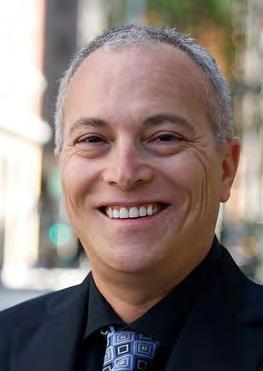

open-air drug dealing and overdose deaths on the streets, homelessness, crime, and lack of affordable housing. Other issues animating the race include the business disruptions wrought by the COVID pandemic that have led to a glut of downtown office space, empty stores throughout the Financial District and Union Square shopping zone, and record budget deficits the mayor and supervisors are grappling to address.
Tuesday night Peskin secured the endorsement of the Harvey Milk LGBTQ Democratic Club, the more progressive of the city’s two main LGBTQ political groups. While Peskin and Safaí, to a lesser extent, are running to the left of Breed with more progressive support, moderates Farrell and Lurie have been attacking her from her right on issues like police staffing and the safety of city residents. It is widely expected one of the five will win the race, likely after one or more
rounds of the city’s ranked-choice voting system. A candidate needs more than 50% of the vote to be declared the winner, and if no one does on the first round of voting, then the candidate with the least votes is eliminated and their voters’ second choices for mayor are tabulated into the total vote count.
The process continues until a candidate reaches the required winning threshold, even if by just one vote. It took nine rounds for Breed to be declared the winner in 2018.
Other candidates
Among the other candidates who made this fall’s ballot are perennial mayoral contenders small business owner Paul Robertson and family social worker Ellen Lee Zhou, a Republican who is a party to the lawsuit challenging San Francisco’s guaranteed income programs for transgender people and other groups.
Also in the race are tech engineers Dylan Hirsch-Shell and Nelson Mei; security specialist Henry Flynn; and former transit engineer Shahram Shariati, who now works as a residential property manager.
San Francisco has yet to elect an LGBTQ person as its mayor. Breed is only the second woman and second Black political leader elected mayor in the city’s history.
Freedman lives a few doors down from where Breed has her campaign headquarters on the 500 block of Castro Street.
“I won’t accuse her of malfeasance and trying to muscle in on my action. At least she is activating a vacant space in the Castro,” he joked to the B.A.R. Now that this year’s mayoral field is set, Freedman told the B.A.R. this week that he hopes to be invited to candidate debates going forward. Those held so far have only featured the five candidates seen as the top contenders in the race.
“I expect this sort of thing to happen because I am an outsider politically,” said Freedman.
Soderstrom participated in a recent San Francisco People’s Debate For Mayor 2024. Any of the mayoral contenders are invited to take part in the weekly events held from 1 to 3 p.m. on Saturdays at the Hidalgo Monument in Mission Dolores Park.
He is aiming to go live June 27 with his campaign website at votejonsoderstromformayor.com.
“I am working on my platform for the mayor’s office,” said Soderstrom. Freedman’s campaign website is already live at mayor.keithfreedman. com. t
Leather district marks Pride
by John Ferrannini
The Leather & LGBTQ Cultural District is marking Pride Month with new placemaking signs in San Francisco’s South of Market neighborhood as the district finishes its cultural report. The district’s executive director also was recognized by the Board of Supervisors Tuesday.
The signs, which say “Leather & LGBTQ Cultural District,” started going up under street signs last week, according to Cal Callahan, a gay man who is manager of the district. There will be 26 signs in total that will be installed within the district’s noncontiguous boundaries – between the Central Freeway, Howard Street and the 101 Freeway, as well as between Bryant and Harrison streets and between Fifth and Sixth streets.
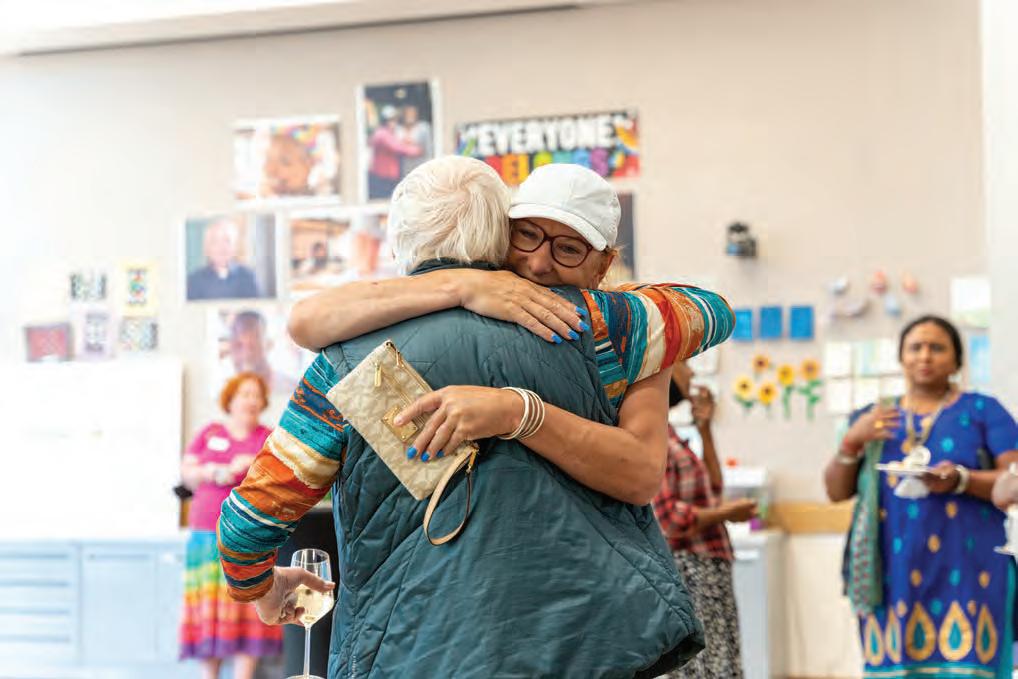
“A second batch of signs is currently being produced at the MTA [San Francisco Municipal Transportation Agency] sign shop,” Callahan said. “They’re going up in stages, the last of which will be installed with the Folsom-Howard streetscape project. Some on Folsom [Street] should go up this year and more next summer.”
The streetscape project, intended to improve bicycle and pedestrian safety on the streets as well as upgrade traffic signals, started last month. The Folsom Street portion of the project is anticipated to finish in 2026, and the Howard Street portion in 2027.
The district also finished its CHHESS, or Cultural History, Housing, and Economic Sustainability Strategies report, Callahan said, making it the third of the city’s 10 cultural districts to do so. Every district has to
write a CHHESS report, which serves as a roadmap for how the district will achieve its goals as per its founding legislation. The reports are approved by the Board of Supervisors and are revisited on a three-year basis, though this report will be revisited on a six-year basis, it states.
The Leather & LGBTQ Cultural District was established in 2018, and, after the Transgender District, is the second of three cultural districts catering to the LGBTQ community. The other is the Castro LGBTQ Cultural District.
The leather district’s report discusses the history of the area.
“SOMA became the San Francisco neighborhood most closely associated with leather, a distinctive LGBTQ subculture that began to form in the
See page 12 >>
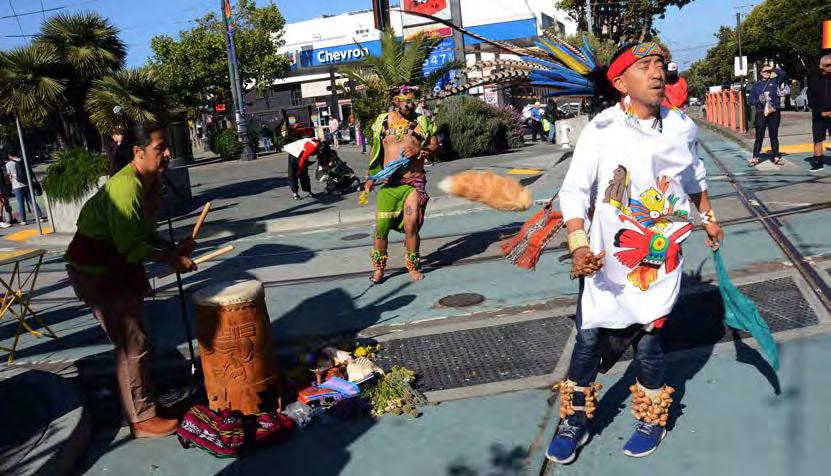
Dancing in memory of Pulse victims
4 • Bay area reporter • June 20-26, 2024 t
<< Election 2024
Members of the Bay Area Mexica Queer, Trans, Two Spirit Collective danced in memory of the shooting victims of the Pulse Nightclub attack during a small remembrance at Jane Warner Plaza in the Castro on June
12. It marked the eighth anniversary of the tragedy at the LGBTQ club in Orlando, Florida that saw 49 people killed and 53 injured.
Rick Gerharter
Keith Freedman is running for San Francisco mayor.
Courtesy the candidate Jon Soderstrom is running for San Francisco mayor.
Courtesy the candidate
2 LGBTQ nonprofits see funding restored Community News>>
by John Ferrannini
At least two of three agencies serving LGBTQ youth that had been anticipating cuts from the San Francisco Department of Children, Youth and Their Families this year now tell the Bay Area Reporter they are no longer expecting those particular reductions.
Sherilyn Adams, a lesbian who is CEO of Larkin Street Youth Services, told the B.A.R. June 14 that an $11 million add-back from the office of Mayor London Breed actually restored the reduction in funding it had anticipated, at least as far as DCYF money is concerned.
“We did receive award notices yesterday from the mayor’s augmentation,” Adams said. “So the funding to our youth workforce and our youth leadership has been restored.”
When asked if Larkin Street will still see some cuts, Adams said, “no, not from DCYF.”
“I think there are unknowns across the workforce, there’s a number of departments that fund workforce development for a number of populations for young people experiencing homelessness, for adults experiencing homelessness, for others that there are some cuts; they too have to have cuts,” Adams said. “But we don’t know what specific organizations are impacted by those.”
Rebecca Rolfe, a lesbian who is executive director of the San Francisco LGBT Community Center, stated to the B.A.R. that “we received notification that the cuts to our youth drop in program have been restored.”
LYRIC, an LGBTQ youth organization in the Castro, is the third of the three nonprofits. Its executive director, Gael Lala-Chávez, did not return multiple requests seeking comment as to whether the agency is still expecting cuts.
A spokesperson for Breed’s office stated June 19 that it “has always in-
Protecting trans people
Regarding your coverage of “San Francisco declares itself a transgender sanctuary city” [Political Notebook, June 13].
Over a year ago, in March 2023, the Board of Supervisors unanimously passed a resolution entitled “Protection of Transgender and Lesbian, Gay, Bisexual, and Queer Youth And Adults.” (https://sfbos.org/ sites/ default/files/r0166-23.pdf)
The resolution was introduced by Supervisor Dean Preston’s office and drafted with transgender activists, drag performers, and trans and nonbinary youth, including my son. The inclusion of youth voices was critical in that resolution, and I wish it had been recognized more.
cluded LGBTQ youth agencies in the DCYF budget from the beginning, despite the recommended 10% General Fund cut from DCYF, which allowed the expansion of the RFP to grow by approximately $11 million,” and therefore the money is not an “add-back.”
The revelations came after a committee of the San Francisco Board of Supervisors got the opportunity to learn more about the impending DCYF cuts as part of this year’s budget proposed by Breed.
The board’s budget and appropriations committee, tasked with reviewing the mayor’s spending plan she released in late May, held a daylong hearing June 13 at City Hall.
In the strictest sense, however, the nonprofits that receive funding from the department aren’t getting cuts at all, according to Maria Su, the DCYF’s executive director.
“In theory there are no cuts,” Su said, acknowledging that the department’s budget is being reduced. “Where one cycle of grant funding ended, another will start July 1. I just want to be clear there’s nothing to base our notion of ‘cut’ from, however, there is a desire to ensure a continuity of services and continuing programming and opportunities for young people and families throughout our city.”
Under Breed’s proposal, DCYF will see a reduction in its budget of $24 million.
District 10 Supervisor Shamann Walton didn’t exactly agree with Su’s way of putting things.
“I wish it was as simple to be able to share your theory of no reductions but I’ll probably be here for a long time today because that’s not how the community feels for sure,” Walton said. “That some of these services won’t be provided I know is gonna be harmful.”
Indeed, Walton was there for a long time – the hearing, which started at 10 a.m., didn’t wrap up till after 6 p.m. However, most of it concerned other
Do the Right Thing core values and, in 2021, the city officially proclaimed June as Pride Month. This move was unanimously supported by the City Council at that time.

While the work of the Office of Transgender Initiatives is important, trans youth have been fighting this alone in the city for a long time. Our kids deserve both support and recognition.
Allyson Eddy Bravmann San
Francisco
All Clayton officials should honor Pride Clayton is the smallest city in Contra Costa County with a population of nearly 12,000.
In 2010, the “Do the Right Thing” initiative was created in the City of Clayton to help children recognize the core values that represent us all as Claytonians. Integrity, honesty, kindness, responsibility, self-discipline, and courage are those values. Councilmembers proudly give awards to students in the community each year commemorating their adherence to these values. In 2020 “Inclusion” was added to the list of
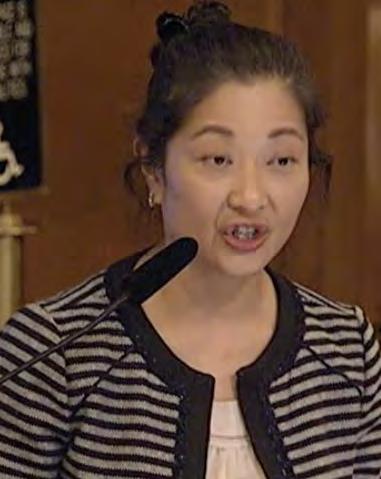

city departments giving presentations about their upcoming budgets.
Walton is joined on the budget and appropriations committee by its chair, District 1 Supervisor Connie Chan; its vice chair, gay District 8 Supervisor Rafael Mandelman; District 7 Supervisor Myrna Melgar; and District 3 Supervisor Aaron Peskin, who is president of the board and is running against Breed for her job this year. Peskin was absent June 13.
It’s not a good budget year, everyone seems to agree, after the city has seen declining tax revenues as businesses leave the downtown core. Already expecting challenges, Breed last December asked city departments for 10% cuts across the board. In addition to the aforementioned deficit, Breed has said the shortfall could reach $1 billion by Fiscal Year 2028.
A budget has to be approved by the Board of Supervisors by August 1; Breed’s spending plan came out May 31, proposing $15.9 billion in spending for Fiscal Year 2024-25.
Before the budget and appropriations committee, Su discussed how the cuts will affect DCYF.
As the B.A.R. previously reported, the cuts to the department’s budget would’ve meant reduced funding to nonprofits serving youth, including three that often serve LGBTQ youth.
LYRIC stated it was facing a 56% cut to its program budget over the next five years from the department and it’s also trying to raise money to stave off the effects. The San Francisco LGBT Community Center stated it was also seeing a 56% cut to its youth services drop-in budget, or $312,012, and Larkin Street Youth Services had been seeing cuts in the amount of $495,225. Su said, “The main takeaway here is to show in 2023-2024 DCYF’s total budget was $212 million and now we’re looking at a total DCYF budget of $188 million.”
Most of that money – 88% – comes from property tax and general fund support, Su said, with a “small portion of state and federal grants.”
There’s been a decrease in five fulltime staff members “over the past several years, because there were some
vacant positions we deleted in the last funding cycle,” Su said.
The department only operates 54% of its budget – the rest goes toward the San Francisco Unified School District, and the San Francisco Community College District, Su said.
The mayor’s office recently granted the department $11 million to continue some of its request for proposal, or RFP, grants that nonprofits apply for. But that $11 million won’t be enough to restore all the funding to the department’s recipients.
“With the mayor’s addition of $11 million, we are hoping to be able to allocate some of those funds to support more programs in the community,” Su said.
Melgar voiced her concern about the reduction in funding.
“I’m worried about the kids,” she said. “After the pandemic we know a lot of kids are behind. They missed out on a year of developmental progress, academically, but socially as well, and I worry regardless of the funding source – philanthropic, state and federal, or our own – the kids still feel it when there’s no youth employment, no after-school programs, and we pay for it as a society in other ways. If you have a bunch of teenagers who are not employed needing income and have extra time on their hands, kids will be kids.”
Chan agreed.
“We have to start really thinking about shifting the spending in the mayor’s current proposed budget, and if we want to put our money where our mouth is, this is one of those departments and one of those moments we have to rethink,” Chan said.
Mandelman didn’t speak on DCYF specifically and did not return a request for comment by press time. No votes were taken, and ultimately the supervisors made it clear they can’t restore funding to particular nonprofits.
Three years ago Clayton volunteers, along with parents of Clayton LGBTQ+ children, established the Clayton Pride organization and pulled together one of the first-ever Pride parades in Contra Costa County. Leaders from communities all across the county have marched together in the parade each year as a show of support. This year, Congressmember Mark DeSaulnier (D-Concord) was the keynote speaker at the Clayton Pride parade on June 2 in downtown Clayton, with over 20 mayors, county supervisors, councilmembers, and others participating. Thousands of paradegoers were present to cheer them on. However, only two current Clayton City Council members, Holly Tillman and Peter Cloven, marched while the other three, including our mayor, a former mayor, and current vice mayor chose not to participate, despite their campaign promises of support. The vice mayor did give $50 but did not march or otherwise support the parade or cause in general. We believe that Pride Month should be a time for everyone to put political differences aside as a show of unity and inclusion in our small city. We are proud to call ourselves one of the first, and by far, the largest in our county to throw a Pride parade. We call on each of our city leaders to join us in celebrating Pride and ask them to lead by example and represent all of Clayton. Please, do the right thing.
Larry McNeill Clayton, California
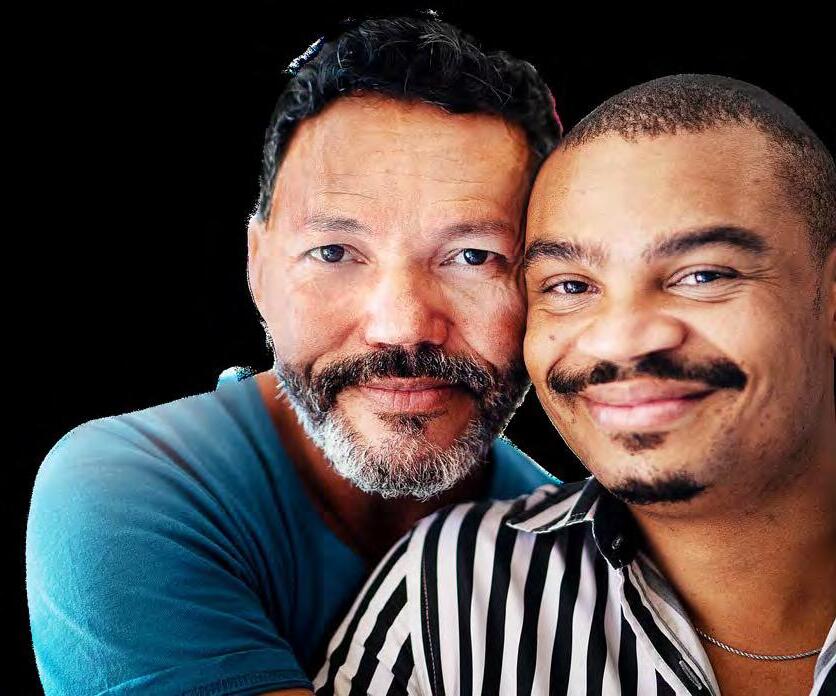
June 20-26, 2024 • Bay area reporter • 5 t SAN FRANCISCO HEALTH PLAN Our community has the right to health care We can help you enroll in Medi-Cal © 2024 San Francisco Health Plan 515201 0524 sfhp.org/careforus
Letters>>
Youth, and Their
addressed a Board of Supervisors budget committee meeting June 13.
Maria Su, executive director of the San Francisco Department of Children,
Families,
Screengrab via SFGovTV
San Francisco Supervisor Shamann Walton spoke at the June 13 budget meeting.
Screengrab via SFGovTV
See page 13 >>
Volume 54, Number 25 June 20-26, 2024 www.ebar.com
PUBLISHER
Michael M. Yamashita
Thomas E. Horn, Publisher Emeritus (2013)
Publisher (2003 – 2013)
Bob Ross, Founder (1971 – 2003)
NEWS EDITOR
Cynthia Laird
ARTS & NIGHTLIFE EDITOR
Jim Provenzano
ASSISTANT EDITORS
Matthew S. Bajko • John Ferrannini
CONTRIBUTING WRITERS
Christopher J. Beale • Robert Brokl
Brian Bromberger • Victoria A. Brownworth Philip Campbell • Heather Cassell
Michael Flanagan •Jim Gladstone
Liz Highleyman • Brandon Judell • Lisa Keen
Philip Mayard • Laura Moreno
David-Elijah Nahmod • J.L. Odom • Paul Parish
Tim Pfaff • Jim Piechota • Adam Sandel
Jason Serinus • Gregg Shapiro
Gwendolyn Smith • Charlie Wagner
Ed Walsh • Cornelius Washington • Sura Wood
ART DIRECTION
Max Leger
PRODUCTION/DESIGN
Ernesto Sopprani
PHOTOGRAPHERS
Jane Philomen Cleland
Rick Gerharter • Gooch
Jose A. Guzman-Colon • Rudy K. Lawidjaja
Georg Lester • Rich Stadtmiller Christopher Robledo • Fred Rowe
Shot in the City • Steven Underhill • Bill Wilson
ILLUSTRATORS & CARTOONISTS
Christine Smith
VICE PRESIDENT OF ADVERTISING
Scott Wazlowski – 415.829.8937
NATIONAL ADVERTISING REPRESENTATIVE
Rivendell Media – 212.242.6863
LEGAL COUNSEL
Paul H. Melbostad, Esq.


Bay area reporter
44 Gough Street, Suite 302
San Francisco, CA 94103
415.861.5019 • www.ebar.com
A division of BAR Media, Inc. © 2024
President: Michael M. Yamashita
Director: Scott Wazlowski
News Editor • news@ebar.com
Arts Editor • arts@ebar.com
Out & About listings • jim@ebar.com
Advertising • scott@ebar.com
Letters • letters@ebar.com
Published weekly. Bay Area Reporter reserves the right to edit or reject any advertisement which the publisher believes is in poor taste or which advertises illegal items which might result in legal action against Bay Area Reporter. Ads will not be rejected solely on the basis of politics, philosophy, religion, race, age, or sexual orientation.
Advertising rates available upon request.
Our list of subscribers and advertisers is confidential and is not sold. The sexual orientation of advertisers, photographers, and writers published herein is neither inferred nor implied. We are not responsible for unsolicited manuscripts or artwork.
Newsom should sign budget bill
With California’s current fiscal year soon coming to an end, Governor Gavin Newsom should sign Assembly Bill 107, the state’s 2024-25 budget bill, which includes some relevant benefits for youth and the LGBTQ community. The Legislative LGBTQ Caucus this week hailed passage of the bill, even in this difficult budget year with the state staring down a $26.7 billion deficit, according to figures Newsom released in May.

“Despite the challenging fiscal times, this budget represents a commitment to protecting and uplifting LGBTQ+ Californians, especially our youth who are disproportionately impacted by mental health challenges,” stated lesbian state Senator Susan Talamantes Eggman (DStockton), caucus chair. “We have fought hard to preserve funding for essential programs that provide critical supports and services, even with difficult budget decisions this year, and we will continue to advocate for these vital programs in future budget years.”
The End the Epidemics Coalition and Youth Mental Health Equity Coalition support these developments, according to a news release from the LGBTQ caucus and the two groups.
We editorialized recently about the caucus’ budget priorities, and it appears that AB 107 contains some of them, though in different forms.
Health
In April, the caucus responded to Newsom’s proposal to borrow $500 million from the AIDS Drug Assistance Program by suggesting he reduce the amount by half. This week, the caucus praised commitments to reinvest a portion of ADAP rebates to better serve all of those living with HIV/AIDS and
modernize ADAP and its associated programs to increase eligibility, ensure more timely access to medications, and increase the amount of insurance premium coverage. It also noted some funds would be invested in the state’s harm reduction clearinghouse and that the bill provides support for communities disproportionately impacted by HIV/AIDS: transgender, gender-nonconforming, and intersex people.
There is also a statutory commitment from the Newsom administration that any loaned ADAP funds will be made available to maintain program operations, provide uninterrupted access to drugs and services, and allow for new programs and services, according to the release.
On a related note, included in the state budget is the full restoration of funding for the Future of Public Health initiative at the public health department’s Office of Health Equity. That will support infrastructure and services for local health departments across the state, including many programs that disproportionately impact the queer community, such as harm reduction interventions and treatment of infectious diseases.
The caucus noted that it’s this health equity office that has traditionally been the state agency that prioritizes health and well-being for the LGBTQ+ community.
End the Epidemics was pleased that a portion of ADAP rebate dollars will be directed to allow for modernization and expansion “while creating pay-back guardrails,” it stated. That’s important because ADAP is one of the most successful programs around and one so many people living with HIV/ AIDS depend on.
Data collection
Collection of sexual orientation and gender identity data has been an ongoing issue with the state health department, as we have reported since the beginning of the COVID pandemic four years ago. AB 107 includes funding to advance LGBTQ+ data collection at the Department of Health Care Services, Department of Public Health, and Health Care Access and Information. The funding will implement system changes to collect voluntary self-identification information. As we reported last December, the health department is working to address lapses in SOGI data collection that were highlighted in a scathing audit by the state auditor in April 2023. The caucus correctly noted in its release that “data is power and collection of this data will empower the state of California to address and reduce disparities” for the state’s LGBTQ communities.
Youth
The budget bill includes protection of the Children and Youth Behavioral Health Initiative Public Education and Change Campaign in the state health department, including funding for communitybased organizations who serve LGBTQ+ youth around the state. It also includes a statewide youth mental health program aimed specifically at queer teens and young adults.
Brandon Tate, president of the Youth Mental Health Equity Coalition, stated that preserving these programs is critical. “The coalition also thanks the Legislature for its work during this difficult budget year in preserving these programs,” Tate stated, urging Newsom to sign the bill.
Queer history brings new future to downtown San Francisco
by Robbie Silver
TheSan Francisco that we all know and love is undergoing quite an evolution.
It has dealt with its fair share of challenges, but as the city continues to pave a path forward to emerge successfully, it’s important to look back at how far we’ve come – and what still needs to be done.
Decades before the Castro became internationally renowned as a queer haven, the fight for LGBTQIA+ rights unfolded in the grid of downtown San Francisco and along the waterfront.
In the early 1960s, the heart of San Francisco’s LGBTQIA+ nightlife thrived at unique establishments like Head Hunters and Ginger’s – providing a haven for those seeking camaraderie and refuge after the bars had closed for the night. After a four-year hiatus, Ginger’s has returned, reopening in time for Pride Month as the Financial District’s sole queer-identified bar. This revival highlights the enduring strength and history of the queer community in San Francisco’s downtown, demonstrating the neighborhood’s resilience and capacity for reinvention. However, as we celebrate these milestones, we must also acknowledge the work still required to embed local institutions more deeply into the fabric of downtown life.
A lot of the work that the Downtown SF Partnership has done to drive people back to downtown leans toward creating a sense of place and destination – with services, activations, and event-driven programming like Bastille on Belden, Let’s Glow SF, and the ever-popular Drag Me Downtown, which just returned for a second year in a row for Pride Month.
The sequin-studded series showcases new drag performers at different downtown restaurants and bars each week to provide direct support to local businesses, shine a light on San Francisco’s LGBTQIA+ community, and drive a diverse range of economic activity downtown – encouraging visitors to experience the area like never before. This annual event is a prime example of how diverse economic activity can transform the downtown area, encouraging visitors to experience it in novel ways and signaling a shift towards inclusivity and accessibility for all.
In addition to celebrating another year of Drag Me Downtown, this June also marks another, more personal milestone. I chose to relocate from Southern California to San Francisco in 2018, but I didn’t fully come out until this year. I’ve learned that bisexual invisibility is real and present, and I deeply appreciate San Francisco for making me realize that who I am as a bi man shouldn’t just be tolerated, but celebrated.
Many, like me, have grappled with questions about their identity – “Am I gay enough? Am I
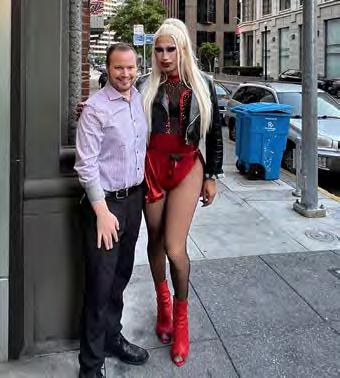
straight enough? Will I ever find love? Will my friends and family accept me?” – and have found solace in this city’s welcoming arms.
Inclusivity and openness have been, and always will be, a crucial piece of San Francisco’s identity, but we must not take it for granted.
To honor and uplift our city’s rich queer heritage, our vision for a post-pandemic downtown must go beyond its traditional role as an office hub. We should foster a diverse array of arts, culture, and hospitality experiences that activate the area outside typical work hours.
This vision began to materialize last September with the launch of Landing at Leidesdorff, (https://downtownsf.org/ things-to-do/landing-at-leidesdorff) a new social destination created in the heart of our downtown adjacent to the Transamerica Pyramid. We transformed an underutilized intersection of alleyways and celebrated the bold history of Captain William Leidesdorff – a young Black visionary regarded as one of the founding fathers of San Francisco. The mural here recalls the historic shoreline and the long wharf, reminding us of the ships that once landed in what’s now a thriving urban center.
atively and inclusively. San Francisco today is not the same city it was three years ago. We must adapt and innovate to keep the downtown area vibrant and thriving. I’ve learned this first-hand in my journey of self-discovery. Like everyone else, I am still growing and evolving. So is downtown.
The area holds immense power and potential to be reimagined as a lively neighborhood brimming with diverse experiences, where people can confidently say, “This is where I see my future.” Achieving this vision requires a collaborative partnership between public and private entities. The pandemic has underscored the value of our interconnectedness, revealing that our best work arises from meaningful interactions. To truly recover and thrive, we must embrace a broad spectrum of perspectives and innovative ideas, moving beyond the traditional mindset that previously anchored us to a mono-economy.
Small but significant enhancements can shift perceptions of what downtown San Francisco has to offer. Achieving this requires creative thinking from various stakeholders to drive meaningful change. What will it take to attract the creative class back to the city and ensure they have a place downtown?
How can we bring in businesses owned by BIPOC communities, LGBTQIA+ individuals, women, and veterans? And how can each of us contribute to this momentum?
There are vacant ground floor spaces in the Financial District and Jackson Square that are ideal for new uses that are not just amenities for the building but serve as a community benefit and bring new audiences downtown. We are already witnessing a downtown renaissance in hospitality with 22 new businesses that opened over the last two years, outpacing closures. Many are near our activated spaces, like Landing at Leidesdorff and Mechanics Plaza.

As we chart the course for downtown San Francisco’s future, it’s clear that honoring our rich history while embracing innovation is key. From the legacy of LGBTQIA+ havens to modern initiatives like Drag Me Downtown, San Francisco’s resilience and inclusivity shine through. By celebrating diversity, supporting marginalized communities, and repurposing spaces for community benefit, we can create a thriving downtown for future generations. This vision embodies the spirit of San Francisco’s past while paving the way for a more inclusive and equitable future. t
These hidden corners and alleyways downtown echo its past as a refuge for diverse communities, underscoring the need to reimagine public spaces to reflect this heritage.
Initiatives like Drag Me Downtown and Landing at Leidesdorff offer a glimpse into a future shaped by the lessons of our past. They demonstrate how we can engage San Francisco’s economic engine cre-
Robbie Silver, a bi man, is the executive director of the Downtown SF Partnership, a 501(c)3 nonprofit organization driven by a mission to create a more vibrant, active downtown that directly supports San Francisco’s economic development. For more information, visit downtownsf.org.
6 • Bay area reporter • June 20-26, 2024 t << Open Forum
Robbie Silver, left, executive director of the Downtown SF Partnership, joined drag performer Bobby Friday at last year’s Drag Me Downtown.
See page 12 >>
Matthew S. Bajko
t Politics >>
Gay men seek East Bay school board seats
by Matthew S. Bajko
In the East Bay city of Hayward, Aus-
tin Bruckner Carrillo is seeking a school board seat this November. Meanwhile, Hayward public school teacher Charlie Jones is running for a school board seat in Pleasanton where he lives.
It marks the first time the gay candidates have sought elected office. Both are believed to be the first out candidates to run for board seats in their respective school districts.
Carrillo, 30, who is the associate director of the Alameda County District Attorney’s Community Support Bureau, is seeking one of three Hayward Unified School District board seats up this year. (It will be the last time they are voted on citywide, as starting in 2026, the K-12 district is moving to having five districtbased seats.)
He launched his campaign last October and has drawn wide support from Democratic elected leaders throughout the East Bay, including Alameda County Supervisor Nate Miley, whom he worked for as a legislative aide. As a first-time candidate, Carrillo told the Bay Area Reporter he wanted to give himself plenty of time to introduce himself to voters.
“What I have seen in Hayward is, time and time again, we push moderate candidates for our school board who get key endorsements and never knock on a door. They end up losing,” noted Carrillo, who grew up in Castro Valley and has called Hayward home for the last decade.
Being an advocate for LGBTQ students in Hayward schools is a main reason for why Carrillo is running. He purposefully held a drag fundraiser as the first of his campaign.
“I don’t want to shy away from being LGBT,” said Carrillo, whose partner of four years, Derek K. Ko, is a chiropractor and health care provider.
While Hayward voters have elected out candidates, Jones would be the first openly LGBTQ+ elected official in Pleasanton, which just marked its 130th anniversary as a city. Ongoing budget issues impacting the city’s schools and its students prompted him to seek the open Area 4 seat on the Pleasanton Unified School District Board of Trustees.
“These are things that put kids at risk. The budget actually harms children,” said Jones, 33, who has lived in Pleasanton since he was 6 years old. “I can’t stand by and watch the district cut programs that made me who I am and cut safety supports I needed when I was in high school.”
It was that support he received from his teachers in high school, when he came out, that prompted him to seek a career in education.
“I knew I wanted to be a teacher because of them,” said Jones, who lives near his city’s downtown district.
After enrolling at Las Positas College, a community college in Livermore, Jones transferred to Arizona State University and earned a bachelor’s in history – secondary education through its Mary Lou Fulton Teachers College. He landed a job teaching social studies at Hayward’s Tennyson High School, where Jones is now department chair and helped rewrite its history and ethnic studies course curriculum to meet the state requirements for teaching LGBTQ history.
“I wanted to come back to the Bay Area because this is the place that has made me who I am,” said Jones.
Until now Jones has focused more on union and teacher activism. He serves on the board of his teachers’ union. If elected a school board member, Jones said his priority will be on ensuring Pleasanton’s roughly 13,200 students in kindergarten through high school are receiving the instruction and support they need to be successful.
“My biggest concern is for the classroom and the students,” said Jones.
Addressing the myriad needs of students, from their education to their
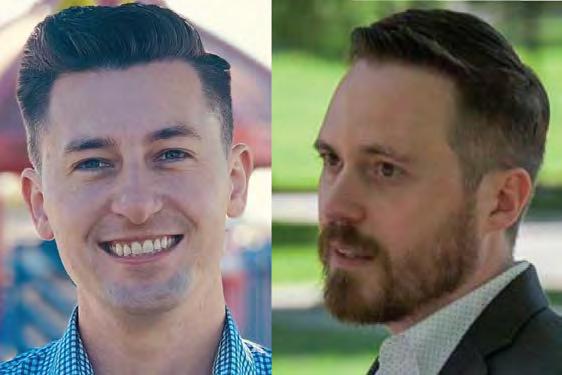
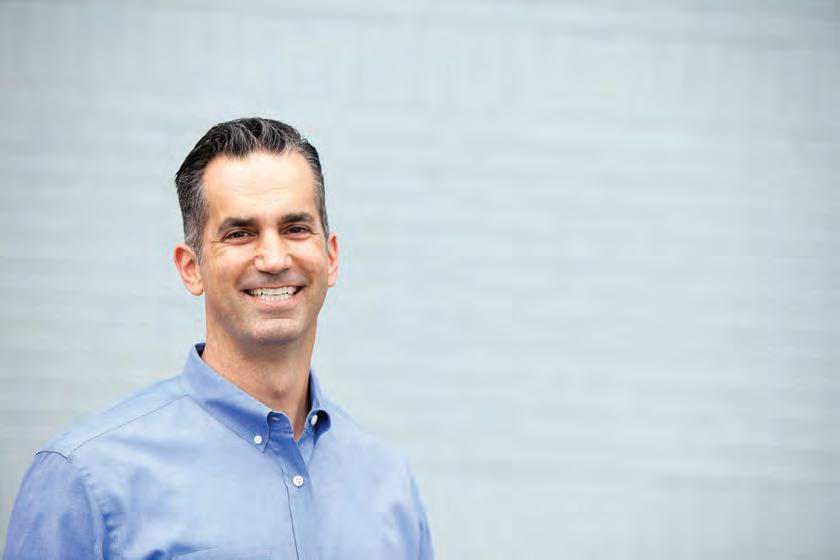
mental health and support outside of school, is also a key reason for why Carrillo is running. He grew up in a household where the police were routinely responding to domestic violence calls, was homeless for a time and lived in a shelter. His Puerto Rican-Italian grandparents ended up adopting him.
Because of his childhood, Carrillo said he will bring a unique perspective to the school board about what many Hayward students are facing in their own lives.
“We have a 57% graduation rate in some of our schools. We have the highest truancy rates and the lowest graduation rates of any school district in Alameda County,” said Carrillo. “I understand those issues because of my own story as a kid. I have spent my whole life working in the government sector working to address that.”
LGBTQ issues roil districts
Their candidacies come as LGBTQ issues have roiled school districts in Alameda County in recent years. Sunol Glen Unified School District board members Ryan Jergensen and Linda Hurley are facing a July 2 recall election following their votes last year to ban flying the Pride flag on school grounds and the decision of Molleen Barnes to retire as the district’s superintendent this month.
Ramos, one of the three board incumbents whose terms end this year, is seeking reelection. For Carrillo, a main goal with his candidacy is to see Ramos be ousted from the school board.
“I have made it pretty clear, of the three incumbents, Joe is the one to unseat,” said Carrillo.
He and Jones have also been supportive of the recall effort in Sunol, but, at the request of the organizers who want it to be locally led, are not playing public roles in it. Jones told the B.A.R. he is hopeful of seeing new leadership for the small school district, which is overseen by a three-person board.
“I think they have a really good shot at it, of being recalled. The community is pretty fed up,” noted Jones, who is partners with gay Tracy City Councilmember Dan Tavares Arriola

The couple has been together two years and are both on their hometown’s ballots this year. Arriola is running to be his city’s mayor for a second time in the November 5 general election.
It also marks the second time Arriola has stood for election while they have dated – he won reelection to his council seat in 2022. Jones told the B.A.R. he did receive some advice from Arriola about running for public office.

Dignity / San Francisco



In honoring Barnes as his Assembly District 24 Woman of the Year in April, bisexual Assemblymember Alex Lee (D-San Jose) noted, “From overseeing recovery efforts after the flooding of Sunol Glen School, to standing up for the LGBTQ+ community, Molly has gone above and beyond in her service to her community.”
Alameda County Republican Party official Tom Wong, who is supportive of the Sunol school board members, earlier this year unsuccessfully sought a restraining order against Carrillo. It for a time distracted him from his campaign efforts and “opened deep wounds” about his family’s past history, as Carrillo noted in a social media post following the court proceedings.
It was advocating at a Sunol school board meeting last fall when Carrillo decided to run for a Hayward school board seat. The Hayward district has been embroiled in its own controversies over the actions of board member Joe Ramos. As the B.A.R. noted in an editorial last June, following his vote against a Pride Month proclamation, “Ramos has a history of antiLGBTQ comments.”
Jones and Carrillo became friends last year due to the controversies surrounding Ramos. As president of Castro Valley Pride, Carrillo had helped mobilize community members for a rally in support of the Hayward school district’s LGBTQ students and staff.
“He told me to make sure you surround yourself with a good team, friends and family to help you get through how stressful this is,” said Jones, who in May attended a candidate training provided by the National Education Association.
To learn more about Jones, visit his campaign website at https://charlieforschoolboard.com/. For more information about Carrillo’s candidacy, visit https://www.brucknercarrillo.com/.
San Jose college trustee kicks off reelection bid
In the South Bay gay San José-Evergreen Community College District Trustee Clay Hale is launching his reelection bid this weekend. Last November, he won election to fill out the remainder of the term vacated by gay San Jose City Councilmember Omar Torres following his 2022 election.
Now Hale is seeking a full fouryear term on his community college board. A teacher at the East Side Union High School District, Hale had told the B.A.R. last year that he intended to run this November.
His District 7 seat on the seven-person board is centered in downtown San Jose. He will officially launch his bid to retain it this Saturday, June 22.
“Join us as we kick off this exciting campaign together and work towards continuing to improve the quality of education for our students,” wrote Hale in an emailed invite.
The campaign kickoff will take place from 2 to 4 p.m. at 1350 N First Street in San Jose. Those interested in attending can RSVP online at https:// tinyurl.com/bdks2ajp. t


RATES: $21.20 per column inch (black & white) $29.15 per column inch (full color)
DEADLINES: Friday 12noon for space reservations Monday 12noon for copy & images
TO PLACE: Call 415-829-8937 or email advertising@ebar.com
* Non-display Obituaries of 200-words or less are FREE to place. Please email obituary@ebar.com for more information.

Our Families & Friends P r i d e L i t u r g y Saturday, June 29th
5:30pm 1329 Seventh Ave, SF www.dignitysf.org Accessible
parking is available on street
city lot. Catholic service ~ All Are Welcome Barry Schneider Attorney at Law •Divorce w/emphasis on Real Estate & Business Divisions •Domestic Partnerships, Support & Custody •Probate and Wills www.SchneiderLawSF.com 415-781-6500 *Certified by the California State Bar family law specialist* 315 Montgomery St , Ste. 1025, San Francisco, CA 94104 The Bay Area Reporter can help members of the community reach more than 120,000 LGBT area residents each week with their display of Obituary* & In Memoriam messages.
LGBTQ+ CATHOLICS †
@
from Muni/Bus (N-Judah) or
or
DISPLAY OBITUARIES & IN MEMORIAMS
ebar.com
Austin Bruckner Carrillo, left, is running for the Hayward school board, while Charlie Jones is seeking a seat on the Pleasanton school board.
Courtesy the candidates
Gay-owned gyms expand in San Francisco
by Matthew S. Bajko
Two gay-owned gyms have expanded in San Francisco, MX3 Fitness and SF Squared Inc. They are part of a wave of locally owned fitness businesses that have moved into vacant storefronts this year in neighborhoods throughout the city.
MX3 Fitness co-owners and husbands Glenn Shope and Dave Karraker in early May opened their new gym in the Noe Valley neighborhood. Their location at 4045 24th Street is now their fourth in San Francisco.
In mid-May Race Cooper opened his first brick-and-mortar location for his fitness business in the Valencia Corridor commercial district. Called the Training Garage, it is located at 1441A Stevenson Street off Clinton Park near Duboce Avenue.
“People are going to local, small gyms to get their workouts. Not just here in San Francisco but throughout the U.S. small gyms are replacing larger gyms,” said Cooper, CEO and head coach for SF Squared.
The increase in smaller, personally owned gyms is an outgrowth of the COVID health crisis, Shope contended. With people no longer commuting to downtown offices, they aren’t going to the larger gyms nearby, he noted, and because they continue to work more days at home, that has remained the case.
“I think people got accustomed to working out close to home because they couldn’t go to a big box gym,” he said.
During the start of the pandemic Shope and Karraker launched the San Francisco Independent Fitness Studio Coalition to lobby for independent gyms and studios that had been severely impacted, first, by forced shutdowns then by the new restrictions placed on them in order to safely reopen. The couple, who live in the Twin Peaks neighborhood, have maintained the coalition to continue advocating for the needs of, and providing support to, local fitness proprietors.
The need for smaller fitness places located near where people live is helping to fill vacant storefronts along neighborhood commercial corridors, pointed out Karraker. Along upper Market Street in the Castro LGBTQ district, for instance, several new smaller gyms have opened or are set to this year.
“Look at the Castro and its empty retail spaces. People should be applauding anybody who moves in,” said Karraker, a former co-president of the neighborhood’s business association.
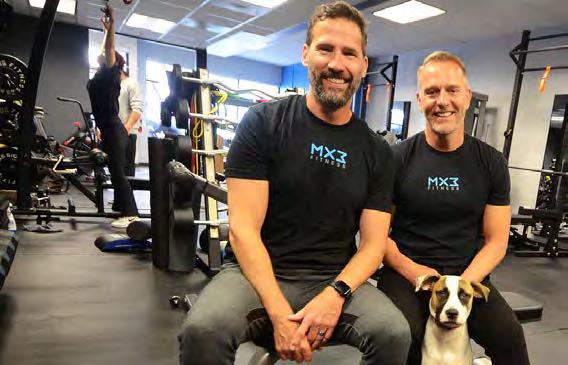
SF Squared Inc. plants a home
Cooper, 50, believes he is the city’s first Black LGBTQ+ owner of a personal training gym and very likely could be the first former porn actor to own their own gym. He was an exclusive star with Falcon Studios until retiring in 2014.
During an interview May 15 on the first day he had opened the Training Garage, Cooper told the Bay Area Reporter he had searched to see if another porn star had done so and couldn’t find anyone.
(Cooper is the name he took on when he began his porn career. Because of past incidents with fans of his X-rated film work stalking him, Cooper asked that his given name and his husband’s name not be published for security reasons.)
He grew up in Toronto, Canada and worked as a gymnastics coach for the local YMCA. He also became a CrossFit trainer and has maintained his core tenets of wanting people to be smart, fit, safe, and have fun when they workout.
“I saw my clients get results faster through my education training,” said Cooper, who moved to San Francisco in 2008.
A key focus for Cooper has been education and teaching his clients how to safely work out.
“There wasn’t enough fitness education available,” he noted. “I want people feeling confident in their knowledge of fitness equipment and their own bodies so they can continue to have healthy, active lifestyles.”
A decade ago, working as a trainer at a Castro gym, he had been in talks to purchase it but opted against doing so. He was then rejected by the owner of a vacant storefront in the neighborhood who said they didn’t want it being used for a gym, though Cooper told the B.A.R. he felt it had more to do with him being a person of color, suspicions he
said were confirmed when he saw a yoga studio open in the space.
He then sought a lease in 2019 for a space in the Bayview, a historically Black neighborhood in the city, accessible by Muni’s T subway line. But then COVID hit, and unsure of the future for fitness businesses, Cooper worked out a deal with his landlord to end his lease early.
He had moved his personal fitness training sessions online and worked out from the backyard of his apartment in the city’s Park Merced housing development. Depressed, Cooper and his husband adopted a Boston terrier puppy they named Gracie Lou Freebush after Sandra Bullock’s character in the 2000 film “Miss Congeniality.”
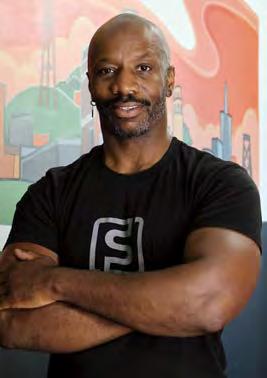
ficked street since his gym is by appointment only. It has space to park his van upfront, with the rear space divided into two workout areas with a changing room and a bathroom though no shower.
The setup allows him to rent out one area to other personal trainers in need of a space to meet their clients while he uses the other area for his own clientele. He is now looking to hire two trainers to take over the mobile classes he has been offering.

Using a $30,000 loan he received via an emergency fund setup due to COVID, Cooper bought a van so he could travel to clients’ homes for their personal fitness classes. It was up and running by the summer of 2021.
“I had a waiting list in no time,” he recalled.
Then the couple moved to Oakland’s Montclair district, but having no garage and not wanting to park his van on the street, Cooper began to look for a solution. He obtained some funding from Working Solutions CDFI last year with the caveat the nonprofit incubator of minority- and women-owned businesses would provide him a larger loan if he secured a location by the start of 2024.
“This was the first of three places I looked at. I thought it was perfect; it was a blank box in a central location,” said Cooper of the garage-like space he ended up leasing.
While it is off the beaten path, Cooper said he didn’t need to be on a high-traf-
Mobile sessions cost $160, while in-studio ones run $130, with either an hour long. He still offers online training for $90 a session and is continuing with his boot camps offered in city parks or for corporate clients.
“I used my ‘gymagination’ to do this,” said Cooper, who had a muralist friend paint his company logo on one wall and a city scene with his van on another.
Wait list at MX3 Fitness
With membership at its Noe Valley gym capped at 200 people, MX3 Fitness has a waiting list for those who want to become members. However, sessions with one of the personal trainers at the gym can be booked by anyone, even nonmembers, based on availability.
The main workout room of the 2,500 square foot space is divided in half. The right side of the gym has various workout equipment and weights for use by the personal trainers.
The area is also available for use by reservation in hourlong intervals. A person can work out alone or with a friend.
The four workout stations set up on the left side each have the various equipment needed to do a full workout with weights. Each station accommodates one
person or two workout partners who can reserve it in hourlong blocks of time.
Shope, 53, and Karraker, 56, had implemented the setup when they reopened their gyms during the first year of the COVID pandemic in 2020 and have kept it due to the positive feedback from their members. It means at any given time no more than 16 people can be working out in the Noe Valley location.
“We don’t want a crowded, big box gym,” said Karraker. “We want you to have a very personalized, low-stress experience.”
Monthly memberships begin at $99 and are based on how much access a person wants to the gym. There are one, three, five, or seven days a week options capping out at $219 a month; members can also add a workout partner to their membership for an extra $20.
The gym is dog-friendly, so members can bring their canine companions with them. Most days the gym’s mascot, Liz Lemon Claiborne Taylor Colton Smith, is present. The couple rescued the yearold pit-bull and boxer mix who was found in Fresno from the SPCA.
“Well behaved dogs are allowed,” said Karraker, whose parents were national park rangers who moved the family to various park sites due to their changing job assignments.
Because MX3 Fitness utilizes a keyless entry system, staff do not be onsite at the Noe Valley gym. Members are texted a code to enter the front door just prior to their reservation time.
It allows for MX3 Fitness to keep its locations open even on holidays. The Noe Valley gym is open seven days a week from 6 a.m. to 10 p.m.
The space came with a secondfloor area that the couple intend to seek approval from the city to use for fitness classes and seminars. Karraker, a San Francisco resident since 1995, is taking over an office space upstairs for his personal public relations firm Raptor Communications. Thus, he expects to be onsite upward of 30 hours a week, while Shope will largely be overseeing the other three MX3 Fitness locations in the Castro, Mission, and Lower Haight.
A former tech programmer who found little success with a startup company he launched in the early 2010s, Shope pivoted to the fitness industry and received certification as a personal trainer in order to make a living.
“I wanted something that would be a return to my athletic training college roots,” said Shope, who uses his programming skills for maintaining MX3’s website and other tech needs. “Now I do it just for myself and our little fitness company.”


8 • Bay area reporter • June 20-26, 2024 t 415-626-1110 130 Russ Street, SF okellsfireplace.com info@okellsfireplace.com OKELL’S FIREPLACE Valor LX2 3-sided gas fireplace shown here with Murano glass, and reflective glass liner
<< Business News
Glenn Shope, left, and his husband, Dave Karraker, recently opened their new MX3 Fitness location in Noe Valley and are joined by their rescue dog Liz Lemon Claiborne Taylor Colton Smith.
Rick Gerharter
SF Squared Inc. owner Race Cooper stands in front of a mural at the Training Garage.
See page 13 >>
Travis Monson


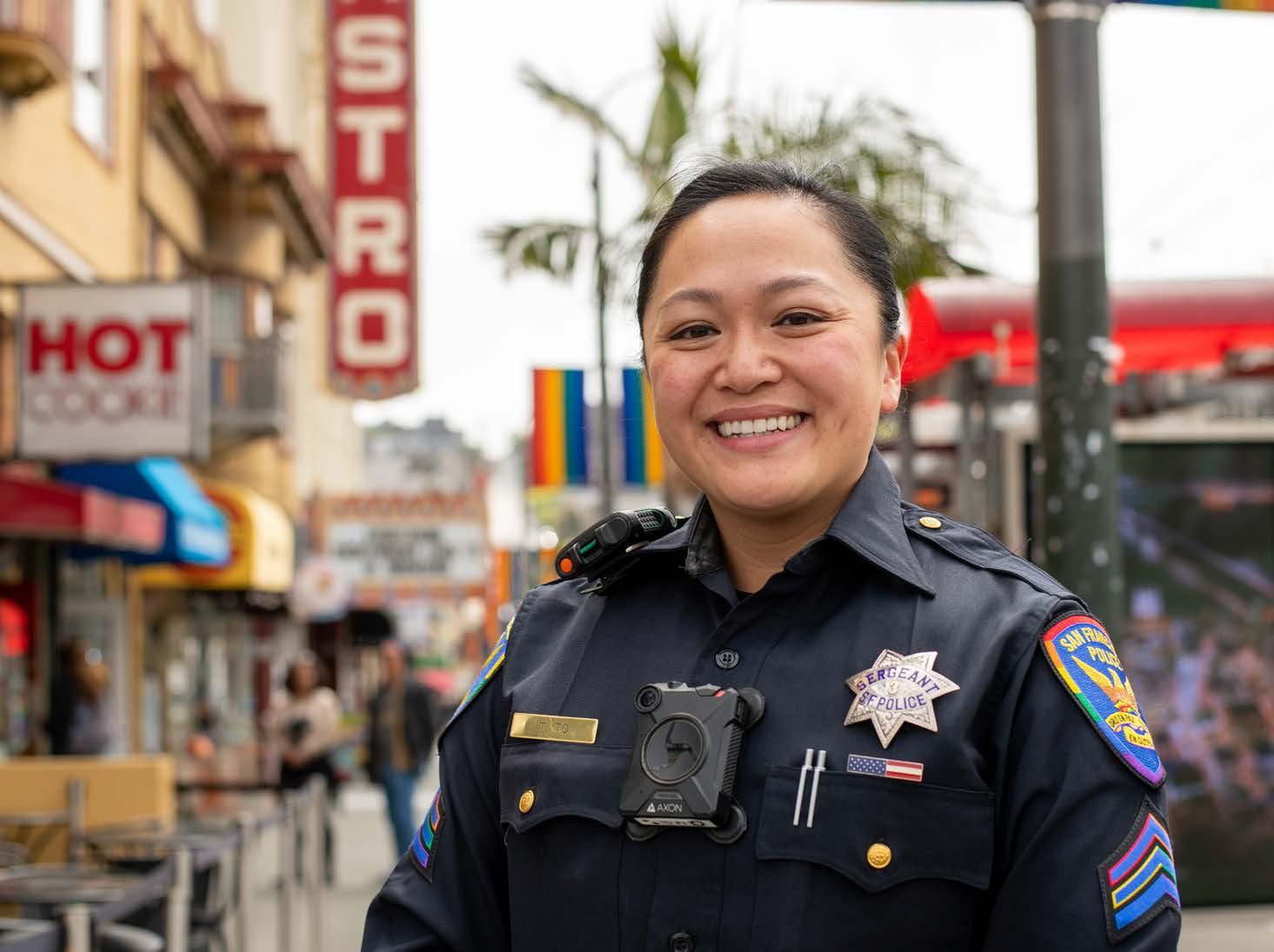

Serving with PRIDE! JOIN OUR TEAM SFPD salary $112,398 to $164,164* •with an Advanced POST certificate TEXT “JoinSFPD” to (415) 704-3688 Join SFPD.com
<< Community News
SF Pride volunteers needed
compiled by Cynthia Laird
The huge San Francisco Pride parade and celebration wouldn’t happen without a lot of volunteers lending a hand, and shifts are available for the June 29-30 event.
From gate access point volunteers to those helping with backstage access for performance groups and speakers, there are a lot of opportunities, according to SF Pride’s website.
Shifts are available for both Saturday’s festival and Sunday’s parade and festival. Some of Sunday’s offerings include helping organize parade contingents and the ever-important gap monitors to help ensure the parade keeps moving.
“This huge endeavor would not be possible without the support of hundreds of volunteers,” SF Pride’s website noted. “By donating some of your time and talent, you are helping to bring essential Queer Joy to our communities.”
For a list of available opportunities, go to sfpride.org and click on “Volunteer.”
Trans swimmer Bailar to keynote Milk gayla
Schuyler Bailar, the first trans athlete to compete in any sport on a NCAA Division 1 men’s team, will be the keynote speaker for the Harvey Milk LGBTQ Democratic Club’s Gayla that takes place Thursday, June 27, at 7 p.m. at Congregation Sherith Israel, 2266 California Street in San Francisco.
Bailar swam for Harvard University for four years and graduated with a degree in cognitive neuroscience and evolutionary psychology in May 2019.
The Milk club’s 48th annual gayla brings together 300 of the city’s influential politicians, community activists, and grassroots organizers. Tickets start at $100.
For tickets and more information, go to https://tinyurl.com/3uyyf34w.
SF’s Excelsior to hold Pride event
Celebrating LGBTQ Pride in San Francisco isn’t limited to the Castro or the Tenderloin. There was a brunch in the Bayview earlier this month and this weekend the Excelsior neighborhood will hold a Pride party. Dubbed the Pride Excelsior Explosion, the event takes place Sunday, June 23, from 2 to 5 p.m. on Otsego Avenue at Ocean Avenue and will feature an afternoon of entertainment, food, drinks, and community celebration, a news release stated.
The party will be hosted by Nitrix Oxide along with Vendetta, Avery Daniels, Aurris Garcon, and Luke Modelo. Talent includes “Walk Around Magic” from Tom Collett, DJs Will and Chris spinning tunes, and drag performances by local favorites, the release noted.
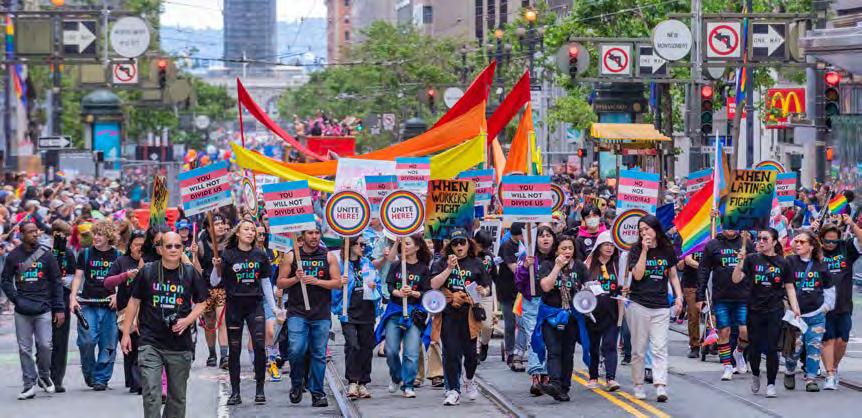
“We’re thrilled to bring together such an amazing group of performers for a fun, inclusive pride celebration right in the heart of the Outer Mission/Excelsior,” stated event organizers Geoffrey Stott and Richard Lugo, “With everything from magic to drag to dancing, there will be something for everyone to enjoy.”
In addition to the free entertainment, the event will have food and drink available for purchase from local vendors. It is family-friendly and open to all ages, the release stated.
According to the release, the Pride Excelsior Explosion is made possible thanks to the support of community partners including the Check-In Lounge, an LGBTQ-owned establishment that provides shared event and work spaces; the Excelsior Action Group, an improvement association serving the neighborhood; and the SF Shared Spaces program.
To reserve a spot or for more information, go to https://tinyurl. com/4suxby3j.
Peskin legislation would help Queer LifeSpace
San Francisco Board of Supervisors President Aaron Peskin has introduced legislation that would help Queer LifeSpace remain in its Castro offices. As the Bay Area Reporter recently reported, leaders of the LGBTQ therapy center at 2275 Market Street said they’re under threat of eviction. (https://www.ebar.com/story. php?ch=news&id=333300)
According to a news release from Peskin’s office, his legislation would create land use controls for the building, The legislation would prevent a change of use at the property in the Castro and Upper Market commercial districts without planning commission approval to anything outside of health or social services for at least 18 months, with an option to become permanent.
The proposal is similar to one Pes-
kin used to save the Punch Line Comedy Club in the Financial District from being converted by Google in 2019. Peskin represents the Financial District, North Beach, and Chinatown, and is also running against Mayor London Breed this November.
“Queer LifeSpace is providing essential health services that the queer community needs now more than ever,” Peskin stated. “In this moment when commercial corridors are struggling to rebound from the pan demic, landlords should be embracing long-term small businesses that add community value, jobs, services, and neighborhood stability.”
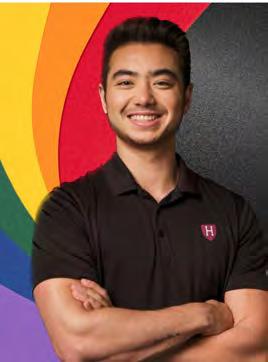
In Queer LifeSpace’s case, landlords are claiming the therapy center owes maintenance costs and fees from the COVID pandemic that are as much as $180,000, as MacCarrigan previously told the B.A.R.
So far, Queer LifeSpace has not received a notice to quit, MacCarrigan previously stated. He did not respond to a follow-up message this week. Aguirre stated that the cultural district supports Peskin’s legislation.

“This is an example of how landlords abuse their power by prioritizing a bottom line of profits over community and common sense,” they stated.
Founded in 2011, Queer LifeSpace is the nonprofit arm of the San Francisco Therapy Collective. Queer LifeSpace also trains therapists to become LGBTQ competent, noted Executive Director Ryan MacCarrigan, a gay man. There are nine first-time clinical trainees and five associates, he said.
“We provide essential services to some of the Bay Area’s most marginalized communities,” MacCarrigan stated in the release. “People come from all over the Bay Area to the Castro seeking culturally-competent, highquality, and affordable health care in a safe space.
“The pandemic, combined with the rise of extremist right-wing groups and policies nationwide have had a profound impact on the queer community,” he added. “We can’t afford to lose another queer space in the Castro or in San Francisco.”
Queer LifeSpace has also received backing from the Castro LGBTQ Cultural District, as it’s located in the district’s footprint. Tina Aguirre, a Latinx genderqueer person who is director of the district, criticized landlords.
“Queer and trans people experience high levels of trauma because of homophobia and transphobia in family and institutional settings. Our hope is that Queer LifeSpace is protected and able to continue to provide the great services they provide in the Castro.”
SFMTA gets grant to improve accessibility
The San Francisco Municipal Transportation Agency announced that it has received a grant through the All Stations Accessibility Program, which is administered by the Federal Transit Administration.
SFMTA will be awarded over $4.6 million to construct platforms, wheelchair ramps, and make other improvements that focus on accessibility, at five Muni rail stops on the J-Church line, and three Muni stops on the MOcean View line.
Two of the J-Church stops designated for grant funds are near the Castro Safeway: the outbound stop at Church Street and Duboce Avenue, and the inbound stop at Church and Market streets.
The B.A.R. in 2022 reported on other transit improvements that were part of the Upper Market Safety Project.
ApplicationsandinformationfoundonDAHLIA-SanFraciscoHousingPortalat housing.sfgov.org.Applicationdueby5pmonJuly2,2024.Call6007th Streetbuilding informationat628.218.7172.
UnitsavailablethroughtheSanFranciscoMayor’sOfficeofHousingandCommunity Developmentandaresubjecttomonitoringandotherrestrictions.Visitsf.gov/mohcdfor programinformation.
Those include new safety guardrails. Last year, the paper reported on how a $10 million pedestrian and bicycle safety project wrapped up. It was also part of the project.
The other stops that will benefit from the grant are: M-Ocean View, final outbound stop at San Jose and Niagara avenues; inbound stop at 19th Avenue and Monticello Street; and the outbound stop at 19th Avenue and Randolph Street.
The other J-Church stops are: outbound at San Jose and Santa Rosa avenues; and the inbound and outbound at San Jose and Santa Ynez avenues.
The new grant will enable system enhancements to increase the number of surface-rail stations with level boarding – improving accessibility for the thousands of residents and visitors with disabilities who rely on Muni to get around the city.
“All of San Francisco’s methods of transportation must be accessible to everyone who uses transit to get around our city,” stated Mayor London Breed.
Jeffrey Tumlin, a gay man who’s SFMTA director of transportation, added, “We are so grateful for this funding to make a more accessible Muni Metro. This grant will help all of our riders enjoy a Muni system that’s fast, safe, frequent, and reliable.” t
Obituaries >>
Ed Gallagher
September 15, 1951 – June 6, 2024

Ed Gallagher of San Francisco’s Twin Peaks neighborhood passed away June 6, 2024 at the age of 73. Ed was a political activist, artist, and active member of the gay and disabled communities. He led a colorful and interesting life and worked to improve his community.
As a blind person Ed was a member of the Bay Area Association of Disabled Sailors and served as commodore for six years. He also worked to develop a remote guidance system for the blind and, in 2010, was featured in the Wall Street Journal for this work.
Rentsrangefrom$1,613-$3073permonth.
HouseholdsmustearnnomorethantheMaximumAnnualIncomebelow:

Ed staged a number of performance art events focusing on AIDS and other issues. In 1984, in the wake of Dan White’s early release from prison for the murder of Harvey Milk, Ed reenacted the event on the plaza near San Francisco City Hall with actors wearing larger than life papier-mâché heads portraying Milk; then-mayor George Moscone, whom White also killed; and White, the gunman, brandishing a three-footlong pistol.
Whether it was bungee jumping or participating in a zero-gravity flight as a blind artist in space, he pursued life to the fullest and was an inspiration to those who knew him. Ed is survived by many friends, and his brother Gary and sister-inlaw Helen who are from the Boston area. See a YouTube video featuring Ed at https://tinyurl.com/v9x3dsrm.
10 • Bay area reporter • June 20-26, 2024 t
units available at 600 7th Street, San Francisco. Rent range for 1 bedroom unit from $1,382 - $2,132; 2-bedroom from $1,535 - $2,547; 3- bedroom from $2,064 - $2,814. Maximum Allowable Income Limits Applications and information found on DAHLIA-San Francisco Housing Portal at housing.sfgov.org. Application due by 5pm on July 2, 2024. Call 600 7th Street building information at 628.218.7172. Units available through the San Francisco Mayor’s Office of Housing and Community Development, and are subject to monitoring and other restrictions. Visit sf.gov/mohcd for program information. 31AffordableRentalUnitsAvailableat78JohnsonStreet,SanFrancisco,CA94130.21 one-bedrooms,2two-bedrooms,4three-bedroomsand4four-bedroomsareavailable.
100 Affordable 1-, 2-, and 3-bedroom
AMI 1Person 2Person 3Person 4Person 5Person 6Person 7Person 60% $60500 $69200 $77800 NA NA NA NA 65% NA $74950 $84300 $93650 $101150 NA NA 70% NA NA NA $100850 $108950 $117000 $125100 75% $75650 $86500 $97300 NA NA NA NA 80% NA $92250 $103750 $115300 $124500 NA NA 85% NA NA $110250 $122500 $132300 $142100 $151900 ApplicationsandinformationcanbefoundonDAHLIA-SanFranciscoHousingPortalat housing.sfgov.org.Applicationsaredueby5pmonMay1,2024.Pleasecallourinformation lineat415-287-0642formoreinformation.
Developmentandaresubjecttomonitoringandotherrestrictions.Visitsf.gov/mohcdfor programinformation.
Household Size 1Person 2Person 3Person 4Person 5Person 6Person 7Person 50%AMI $52,450 $59,950 $67,450 $74,950 $80,950 NA NA 60%AMI $62,950 $71,950 $80,900 $89,900 $97,100 $104,300 $111,500 70%AMI $73,450 $83,950 $94,400 $104,900 $113,300 $121,700 $130,050 75%AMI $78,700 $89,950 $101,150 NA NA NA NA 80%AMI NA $95,900 $107,900 $119,900 $129,500 $139,100 $148,650
UnitsavailablethroughtheSanFranciscoMayor’sOfficeofHousingandCommunity
ADfor600-7th Street. 100Affordable1-,2-,and3-bedroomunitsavailableat6007th Street,SanFrancisco. Rentrangefor1bedroomunitfrom$1,382-$2,132;2-bedroomfrom$1,535-$2,547;3bedroomfrom$2,064-$2,814. MaximumAllowableIncomeLimits
Labor groups marched in last year’s San Francisco Pride parade.
Jane Philomen Cleland
Former collegiate swimmer Schuyler Bailar
Courtesy Milk club
CDC finalizes doxyPEP guidelines for STI prevention Health News>>
by Liz Highleyman
The federal Centers for Disease Control and Prevention has released guidelines for using the antibiotic doxycycline as post-exposure prophylaxis to prevent sexually transmitted infections – an approach known as doxyPEP – finalizing a draft issued last October.
According to the June 4 guidelines, the federal agency recommends that health care providers discuss the use of doxyPEP with all gay, bisexual, and other men who have sex with men and transgender women who have had chlamydia, gonorrhea, or syphilis within the past year. For other groups, providers are urged to use clinical judgment and shared decision-making.
“These final CDC recommendations provide important guidance on who may benefit from doxyPEP and practical guidance on prescribing, monitoring, benefits, and risks,” Dr. Annie Luetkemeyer of UCSF, who coled one of the major doxyPEP studies, told the Bay Area Reporter. “Clear national guidelines help programs, providers, and people who may be interested in doxyPEP use this new STI prevention tool safely and effectively and reach those who may benefit most.”
DoxyPEP involves taking a single dose of doxycycline within 72 hours after anal, vaginal, or oral sex. It can be taken on consecutive days if sex is repeated, but no more than one dose in a 24-hour period. It is safe to use with HIV PrEP. Because it’s an antibiotic, doxycycline does not prevent viral STIs such as HPV, herpes, or mpox.
The new guidelines are supported by findings from the DoxyPEP trial, first presented at the 2022 International AIDS Conference. (https:// www.ebar.com/story.php?319396)
The study enrolled more than 500 men and transgender women who have sex with men at public health clinics in San Francisco and Seattle. About a third were living with HIV and the rest were taking PrEP. They were randomly assigned to receive a single dose of oral doxycycline after condomless sex or standard care, which is regular testing and treatment after an STI diagnosis.
The study was stopped a year early after an interim analysis showed that doxyPEP significantly reduced STI incidence. For people with HIV, doxycycline reduced the risk of acquiring gonorrhea by 57%, chlamydia by 74%, and syphilis by 77%. For those on PrEP, the risk reduction was even greater in most cases: 55%, 88%, and
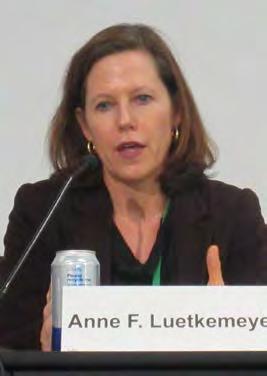
87%, respectively. Two French studies also showed that doxycycline reduced the risk of chlamydia and syphilis, though it was less effective against gonorrhea. But a study of cisgender women in Kenya found that doxyPEP failed to reduce the risk of STIs, possibly due to low adherence.
Preventive use of doxycycline is not without concerns, mainly that widespread use of antibiotics could encourage drug resistance. So far, however, researchers have not seen a marked increase in antibiotic resistance associated with doxyPEP, according to Luetkemeyer. Another is that frequent antibiotic use could disrupt the microbiome, the ecosystem of healthy bacteria that normally live in the gut and elsewhere in the body.
Who benefits from doxyPEP
According to the new guidelines, published in the June 6 Morbidity and Mortality Weekly Report, (https:// www.cdc.gov/mmwr/volumes/73/rr/ rr7302a1.htm) providers should offer gay and bisexual men and trans women with a recent history of STIs a prescription for doxycycline so they can administer it themselves after sex. The prescription should include enough doses to cover anticipated sexual activity until the next visit. People prescribed doxyPEP should be tested for STIs every three to six months, and the ongoing need for doxyPEP should be reassessed on the same schedule.
The authors emphasized that doxyPEP “should be implemented in a context of a comprehensive sexual health approach, including risk reduction counseling; STI screening and treatment; recommended vaccination; and linkage to HIV PrEP, HIV care, or other services as appropriate.”
Although it has not been directly tested in trials, the guidelines say that
doxyPEP could also be discussed with men who have sex with men and trans women who have not had an STI within the past year if they expect to participate in sexual activities that are known to increase the likelihood of STI exposure.
The pharmacokinetics of doxycycline and its effectiveness for STI treatment suggest that doxyPEP should work for other groups, including cisgender women, cisgender heterosexual men, transgender men, and other queer and nonbinary people, according to the CDC guidelines. But because data from formal studies are lacking, providers “should use their clinical judgment and shared decision-making to inform use of doxyPEP with populations that are not part of CDC recommendations.”
The San Francisco Department of Public Health issued the first local doxyPEP guidelines in October 2022. At the Conference on Retroviruses and Opportunistic in March, DPH researchers reported that the early rollout has already contributed to about a 50% reduction in chlamydia and early syphilis, though there was no significant change in gonorrhea.
San Francisco’s doxy PEP guidelines are broader than the CDC’s. They include transgender men along with cisgender gay and bisexual men and trans women, and apply to those who have multiple male sex partners even if they have not recently had an STI.
The California Department of Public Health goes further, saying providers can offer doxyPEP to all nonpregnant people at increased risk for STIs and to those who request it even if they have not previously been diagnosed with an STI or have not disclosed their risk status.
Implementation and access
The new guidelines were finalized after careful consideration of comments on the draft version from the public and experts, as well as consideration of the available scientific evidence, according to Dr. Laura Bachmann, acting director of the CDC’s Division of STD Prevention, and Dr. Jonathan Mermin, director of the National Center for HIV, Viral Hepatitis, STD, and TB Prevention.
“We believe this is the right step for right now to protect the nation’s health, although we are constantly learning more about how to prevent STIs. We will continue to adjust our recommendations as additional data are available,” Bachman and Mermin wrote in a letter to colleagues. “As always, we will provide updates as we learn more.”
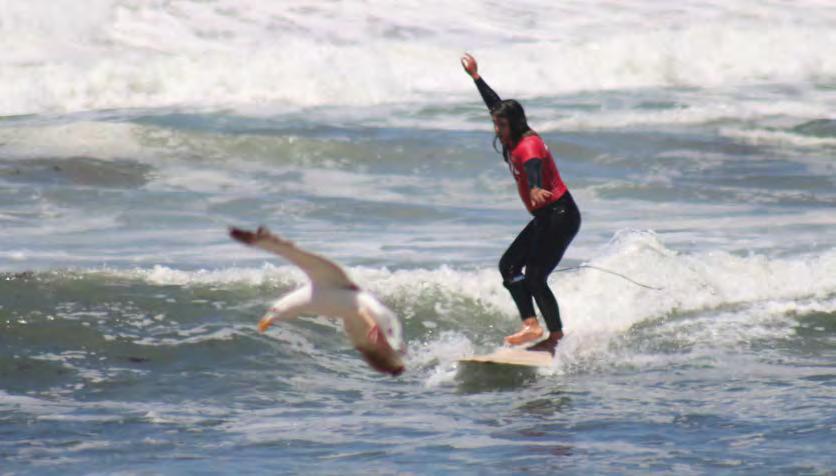
Surfers SWITCH it up in Pacifica
flies by as Vixen
catches a wave during the
June 15 at Linda Mar
by
to drag and other performances and a community celebration on the beach. Different from typical elimination surf contests, SWITCH had no judges, winners, or losers, and instead was structured around celebrating and uplifting queer expression, talent, and joy, a news release stated. For more information, go to queersurf.org.
The new guidelines have generally been well received, but some clinicians and advocates have concerns about implementation and equitable access.
“The new CDC implementation guidance on doxycycline for STI prevention is an important and timely confirmation of the science behind doxyPEP,” Dr. Jeffrey Klausner of the University of Southern California, and a former San Francisco deputy health officer, told the B.A.R. “Federal
guidelines help support widespread use, reimbursement, and access, hopefully ensuring no one is left behind.”
Mitchell Warren of AVAC, an advocacy group, added, “As with any new prevention option, it is essential for advocates to insist on and engage with user-centered, comprehensive and collaborative implementation programs and policies to help make sure the new CDC guidelines are translated into public health impact.” t
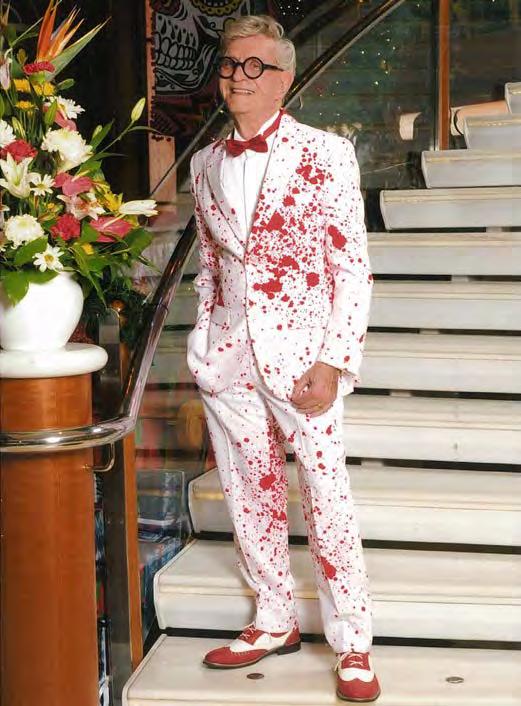
Rev. James (“Jim,” “Jimmy,” “Jimmie”) Charles Johnson left the planet peacefully on May 16, 2024. He was surrounded by his chosen family at the Manor, his home in San Francisco since 1975. He was 89 years old and will be dearly missed.
Jim was born on October 23, 1934 in Okmulgee, Oklahoma to Laura “Charlene” Britten and Roy Johnson. He grew up in Lawton, Oklahoma; Long Beach, California; and Joplin, Missouri. He was raised by his maternal grandparents, Doris Setser and John Britten, and his great-aunt and great-uncle, Inez and Gene.
Jim will be remembered for his captivating stories, larger-than-life personality, and the community he cultivated. He displayed extraordinary style through his colorful suits, spiffy shoes, and abundant home decor. Always crafting and collecting, Jim filled his home with spoons, coins, stained glass lamps, homemade walking sticks, and artwork from his world travels. He sought joy everywhere and found it easily while tap dancing, vacationing on a cruise, or attending a Broadway musical.
Jim was a lifelong swing and tap dancer, who in his 70’s became a beloved fixture of the Metronome Dance Center’s productions in San Francisco. Jim performed in the “Dance-Along Nutcracker” and in the “Gray Cabaret” at the iconic Castro Theatre. He was groundbreaking during his military career for producing a rendition of “Boogie-Woogie Bugle Boy” for benefit shows, in which he cast the Andrews Sisters as three male officers, in full drag.
His motto was “Thoughts become things” which he regularly followed with, “choose the good ones!” Jim had a strong spiritual framework and was active at Unity San Francisco. He believed that people visualize the world they ultimately live in, and he wanted people to give each other a chance to heal and grow in community. With that in mind, Jim dedicated much of his energy toward being of service. He was a frequent diner and supporter of Delancey Street, a residential self-help organization, where he befriended and mentored many program participants.
Jim self-published a CD compilation and four books covering the topics of introductory statistics, the state of joy, hypnosis, and celebrating life. In addition to his eclectic passions and pursuits, Jim held academic distinctions in various fields. He earned a Bachelor of Science in chemical engineering, a Master of Business Administration, a certification in hypnotherapy, and ordination as a reverend in A Course in Miracles. Throughout his life, Jim worked as Chief Chemist at Atlas Powder Company, Naval Officer in the US Navy, Systems Analyst at Matson Navigation Company, Statistics Instructor at Golden Gate University, Educational Services Officer at the Oakland Army Base, and Manager of five residential properties in San Francisco.
Jim is preceded in death by his partner of 15 years, Eddie Pendergrass; ex-wife, Eleanor Winant; and many chosen family members, including Jere’ Marcum and Polly Gilmore. He is survived by his cousin, Brian Johnson, and members of his chosen family, including: Stephanie Almeida, Kathy Burnett, Juan Cornier-Velez, Dona Cupp, Ken Daigle, Helen Ebon, Patrik Gallineaux, Mauro Hernandez, Kirill Keleev, Mary Lace, Julie Lawlor-Nigro, George Love, Faustino Martinez, Helen Marquez, Christopher Rennacker, and Taylor Whitehouse.
A Celebration of Life Extravaganza will be held at the Potrero Hill Neighborhood House from 3-6 pm on October 27th, honoring what would have been Jim’s 90th birthday. All friends and family are invited to attend. On October 23rd, there will be a private scattering of Jim’s ashes. In lieu of flowers, donations can be made to the Delancey Street Foundation, an organization that Jim held very near to his heart.
June 20-26, 2024 • Bay area reporter • 11 t
Aseagull
Jamieson
SWITCH surfing exhibition
Beach in Pacifica. Hosted
Queer Surf, SWITCH featured transgender, queer, and nonbinary surfers and was co-sponsored by the California State Parks Foundation. SWITCH showcased surfers of all levels, in addition
Dr. Annie Luetkemeyer Liz Highleyman
Nic Brisebois
late 1940s in several major American cities,” the report states. “As described by anthropologist and leather historian Gayle Rubin, leather was associated with a subgroup of gay men as a symbol of masculinity. Although the ‘leather’ in question referred primarily to black leather motorcycle gear, community members also donned other styles of working-class male fashion. Levis were popular, and some early leather bars were often called ‘Leather-Levi’ bars.”
Folsom Street earned the nickname the “Miracle Mile” due to the many gay bars and bathhouses that operated on or near the main artery through SOMA in the 1960s and 1970s.
But the onset of the AIDS epidemic in the 1980s soon would diminish SOMA’s leather scene. The health crisis resulted in most gay bathhouses and sex clubs in the area closing their doors.
In the 1980s there were at least 40 LGBTQ venues, bars, and businesses in SOMA. Today, the cultural district knows of just 11.
The report also lists recommendations for the district based on community feedback. One long-term goal outlined in it is opening a Leather and LGBTQ community center in the district’s boundaries.
In the meantime, district leaders plan to identify and utilize vacant spaces within it for “community events and new businesses.” Other priorities include continuing research into the district’s history and exploring ways to update zoning rules.
Meeting the housing needs of the leather and kink community is also addressed in the report. It calls for supporting “models of LGBTQ and/or communal housing” within the district boundaries and expanding “dignified
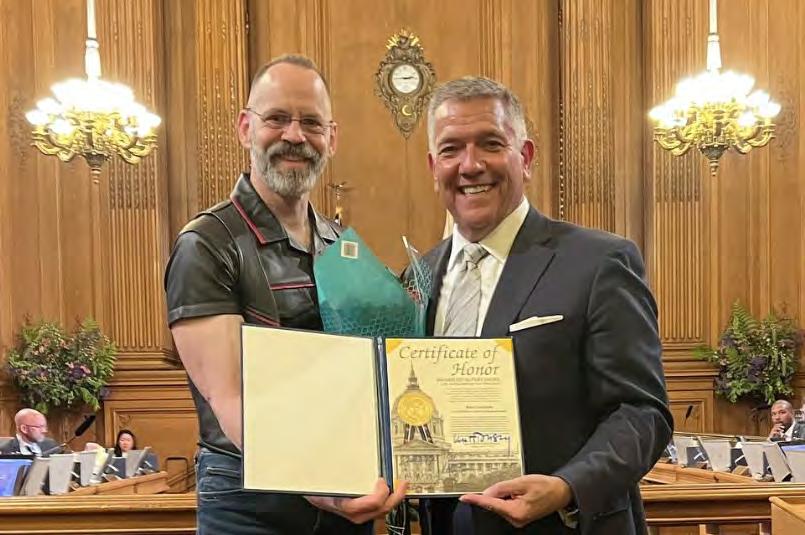
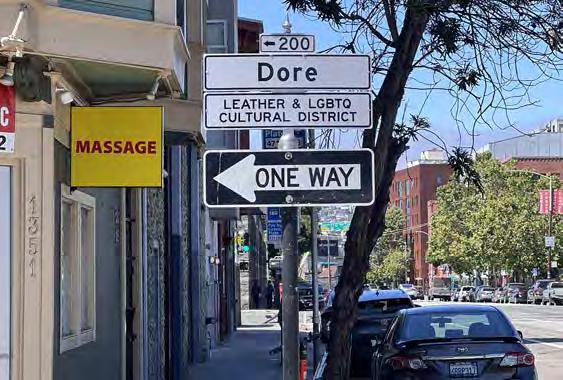
and humane housing and sanitation options for the … district’s unhoused community members.”
The report has 32 total recommendations. One calls for creating “clear paths to LEATHER & LGBTQ Cultural District leadership for and increase engagement among BIPOC, women, trans, sex worker, and disabled community members.”
It also recommends the district “create a nightlife and entertainment revitalization and sustainability plan” and create a task force to explore community safety and conflict intervention strategies. It also calls for continued support of the district’s entrepreneur training program, which the Bay Area Reporter’s monthly Business Briefing column featured in January; another cohort is planned to begin this summer.
“Moving forward, the district and city will continue to work together to implement these recommendations, and will aim to evaluate progress on the
report every three years and update the report every six years,” the report states.
The supervisors Public Safety and Neighborhood Services Committee approved the report at its June 13 meeting. It was sponsored by the three gay supervisors – District 6 Supervisor Matt Dorsey, who represents the SOMA neighborhood on the board; District 8 Supervisor Rafael Mandelman; and District 4 Supervisor Joel Engardio. Before she joined fellow committee members Dorsey and Engardio in voting yes, District 2 Supervisor Catherine Stefani was added as a cosponsor at her request.
The report should be heard by the full board at its June 25 meeting, Callahan said, when it is expected to be approved.
ED honored Dorsey chose June 18 to honor Robert Goldfarb at the board’s meeting. Goldfarb is a gay man who is the
executive director of the district and moved to the city in 1997 largely due to its thriving leather scene.
“Bob’s leadership and dedication has been truly transformative,” Dorsey said.
“Bob has been a steadfast leader in the leather community for more than two decades.”
He mentioned Goldfarb was featured as Mr. February in the Bare Chest Calendar back in 1988. The calendar is a fundraiser for LGBTQ and HIV/ AIDS organizations and recently celebrated its 40th anniversary.
“I know some of my staff members are looking forward to having those in their offices next year,” said Dorsey, noting that Goldfarb had joined him in celebrating the installation of the district’s first street signs, which are “similar to those you can find in other sections of the city.”
Goldfarb thanked Dorsey and the board for the certificate of commendation.
“I have a long history with San Fran-
cisco,” he recalled. “In 1976, I saw an article in Time magazine that said there were homosexuals in San Francisco.
“They had a picture in front of the Painted Ladies, and so I knew that there were six of them,” he said, to laughter, referring to the iconic homes next to Alamo Square Park. “In 1990, my mother brought me here for a high school graduation trip, and I was looking for those six people but I didn’t find them.
“Six years later, my boyfriend said, ‘Let’s go to San Francisco for the Folsom Street Fair,’ and I said, ‘Sure. What’s that?’ Little did I know, 10 years later, I would be producing the fair,” said Goldfarb.
He moved to San Francisco six weeks after he was in an airport and noticed “all the fun people were going on the San Francisco flight, and I was on my way to another concourse and I thought, ‘I’m on the wrong plane,’” he said.
“I love this city and am glad to be here,” he concluded. t
There are other programs and services we’d like to see funded in the budget
<< SF Pride
From page 1
Local reactions
The imbroglio with the Jewish Community Relations Council Bay Area began June 4, when SF Pride made an Instagram post stating that it wanted to address “comments and misinformation about our current policies and practices.”
“There is no Israeli float in the SF Pride Parade. SF Pride values the contributions of Jewish queer individuals in advocating for peace and acknowledge their enduring efforts. SF Pride is carefull [sic] not to conflate Jewish groups and Jewish people living in America with the state of Israel,” the post stated. “We have welcomed and continue to welcome pro-Palestinian groups to the SF Pride Parade. If more are interested, they can join the Resistance Contingent (with the SF Pride Board), or if such a group wants to have its own contingent, we invite them to request a fee waiver.”
The post also stated that SF Pride did not ask for an increased police presence, that “SF Pride’s sponsors, corporate and otherwise, have no influence over the content of our programming or the stance of the organization,” and that “SF Pride has never used the label ‘terrorist’ to refer to protesters as we deeply support the rights of our community to be heard.”
SF Pride’s board had previously called for a ceasefire and the release of the hostages, as the Bay Area Reporter previously reported.
On June 7, Tye Gregory, a gay man who is CEO of JCRC Bay Area, sent an email blast alongside the publication of an op-ed in the Washington Blade, which was written with Jeremy Burton, CEO of the JCRC of Greater Boston.
“San Francisco Pride released a poorly worded statement to the effect that there was ‘no Israeli float’ in the upcom-
that were not mentioned in the caucus’ release. That includes money for the TGI Wellness Fund and funding for lesbian state Senator Caroline Menjivar’s (D-San Fernando Valley) Senate Bill 954. This bill, a version of which was
vetoed by Newsom last year, is the Youth Health Equity and Safety Act, or YHES. It seeks to address the sexually transmitted infection epidemic among California youth and improve equitable public health outcomes statewide by expand-
ing teen access to condoms in schools and communities. Menjivar’s bill has been set for a hearing next week.
Overall, it’s important that Newsom sign the budget bill so that programs can continue to receive funding. With
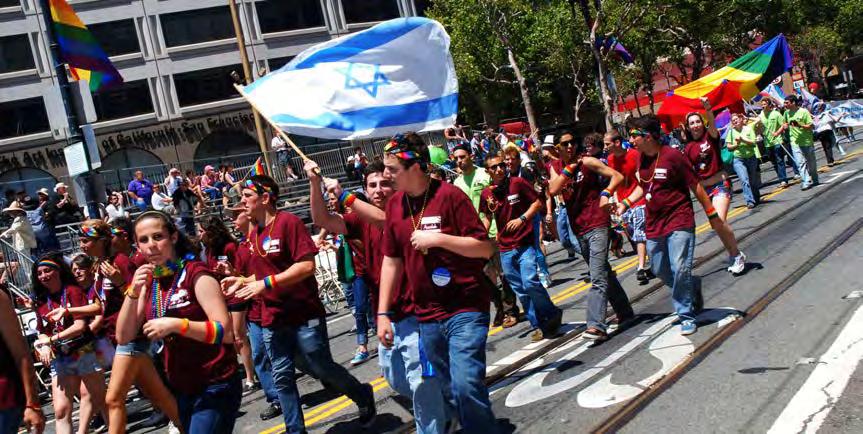
ing parade, which caused confusion and consternation across our community,” Gregory stated. “JCRC Bay Area has been working with SF Pride Executive Director Suzanne Ford for several months to assure a safe and inclusive parade for LGBTQ+ Jews, and we were disheartened by the statement.
“However, I’m pleased to say that Suzanne and her team have been very receptive to our community’s needs and SF Pride quickly clarified its position to affirm that LGBTQ+ Jews, Israelis, and allies are all welcome at Pride,” Gregory added.
Gregory continued by stating, “it’s important to keep in mind that, just like in other communities, anti-Israel activists are a small but vocal minority.”
“LGBTQ+ Jews and Israelis can look forward to marching as their (our) full authentic selves in the San Francisco Pride parade on June 30, and JCRC will continue its work, as the largest collective Jewish voice in the Bay Area, to ensure that all LGBTQ+ people –
regardless of religion, nationality, race, ability, identity or creed – are welcome,” Gregory continued.
In stating that SF Pride had “clarified its position,” Gregory linked to screenshots of another Instagram post, this one on June 6, which stated that registrations for floats had closed June 3, that “no organizations or groups were turned away from participating in this year’s activities,” and that “we gave always welcomed ALL faith communities to participate: all Jews, Christians, Muslims, Hindus, Pagans, and more.”
“All LGBTQ+ people and allies are welcome at San Francisco Pride, and that includes Israelis and Jewish people just as it does Palestinians and Muslims,” the post stated.
Pro-Palestinian group boycotting
Mindy Spatt, a Jewish lesbian with QUIT!, or Queers Undermining Israeli Terrorism, told the B.A.R. on June 13 that her organization doesn’t have a
stance on the dueling statements.
“I’m not sure we have anything to add to this story,” Spatt said. “We support the call for a boycott of Pride. We have had issues, as a group, for years with a lot of aspects of Pride – the corporate sponsorship, the presence of police – and at this moment in time, we agree that a boycott is needed. There is no pride in genocide.”
Spatt said that QUIT! is continuing to reiterate “the demand for a ceasefire and for Israel to withdraw from the occupied territories,” referring to the Gaza Strip and the West Bank. The West Bank is occupied by Israel but has widespread international recognition as being, with the Gaza Strip, the State of Palestine.
The Instagram account gay.shame shared news of the boycott with a post June 12 announcing a Pride event of its own – “Queer as in Intifada: SF Pride rides with genocide” – Sunday, June 23, at 2 p.m. at Castro and Market streets.
(“Intifada” is Arabic for a rebellion or uprising. It’s been used twice to refer to
budget cuts hitting cities like San Francisco and Oakland, to name just two, it’s imperative that the state, while facing its own shortfall, help local governments, especially programs related to public health and youth needs. t
uprisings against the Israeli occupation of the Palestinian territories, which has been ongoing since the end of the Six Day War in 1967.)
“Mask up and bring friends, lovers, enemies, free stuff to give away, zines, food, signs, banners, noise makers, anger, rage, love, and more,” the post states.
The reason given for the boycott in the post is “for decades SF Pride has waged a war against collective liberation in the name of corporate power. A rainbow celebration of global genocide, it’s now a parade for our oppressors.”
“From Mayor London Breed, Matt Dorsey, and Scott Wiener’s hate for the unhoused, Manny Yekutiel’s Nakba denial, Google’s apartheid architecture spanning the Bay to occupied Palestine, and Apple’s war profiteering in Congo, to DA Brooke Jenkins’ cover up of Banko Brown’s murder, and Chevron’s scorching of the whole earth, this is not our legacy, these are our enemies,” the post states.
Yekutiel is a gay Jewish business owner in the Mission district; Dorsey is a gay member of the San Francisco Board of Supervisors; Wiener is a gay Democratic Jewish state senator representing San Francisco, and Jenkins is the district attorney of San Francisco. Last week, the state Attorney General’s office found her office did not abuse its discretion in not charging the man who killed Brown, an unhoused Black trans man, as the B.A.R. reported.
Wiener stated in a text message June 13, “I don’t comment on hateful posts that literally contain the Hamas red triangle.”
Dorsey stated he has “no specific response, other than that I’m looking forward to having a great time at Pride, where we celebrate our community and the wide diversity of opinions represented in it.”
Breed, Yekutiel, Apple, Jenkins, Chevron, and San Francisco Pride did not return requests for comment for this report by press time. t
12 • Bay area reporter • June 20-26, 2024 t << Community News
<< Leather district From page 4
Placemaking signs denoting the Leather & LGBTQ Cultural District have begun appearing around western South of Market in the district’s footprint.
Bryan Dahl
Bob Goldfarb, left, executive director of the Leather & LGBTQ Cultural District, was presented with a commendation from Supervisor Matt Dorsey at the board’s June 18 meeting.
Courtesy Supervisor Dorsey’s office
<<
From
Editorial
page 6
Jewish congregations marched in the 2010 San Francisco LGBT Pride parade.
Rick Gerharter
by Brian Bromberger
In her inaugural speech when she was introducing Frameline48’s slate of films to the press, new Executive Director Allegra Madsen made a connection between our dire political crisis and the Frameline Film Festival’s mission.
“We are going to change the world through the power of queer cinema,” she said. “We are going to control the narrative, which has been Frameline’s purpose since 1977. In these times of conflict and struggle, art and storytelling are absolutely critical. It puts images to emotions. It creates stories out of feelings. It gives us a means to stand up for each other. It gives us the language we need to create the world we want.”
Here is the second round of reviews.
A visual slice of life encompasses writer/director Alessandra Lacorazza’s debut family drama, “In the Summers,” which follows two sisters, Eva and Violeta, living with their mother in California, who over four summers within a decade, will visit their father in Las Cruces, New Mexico.

Starting as teens, the first visit goes well as they stay in Vicente’s (Rene Perez Joglar aka Residente, a Puerto Rican rapper) house inherited from his late mother. He teaches them to play pool and stargaze, but he’s reckless, has a temper, and drinks too much. Each visit, especially at the end of the second one when there is trauma, will lead to disappointment as they all get older, but also growing empathy for each other’s flaws.
The dialogue is minimal and the action is inferred through the body language of the actors, all of whom are excellent. Violeta (Lio Mehiel)

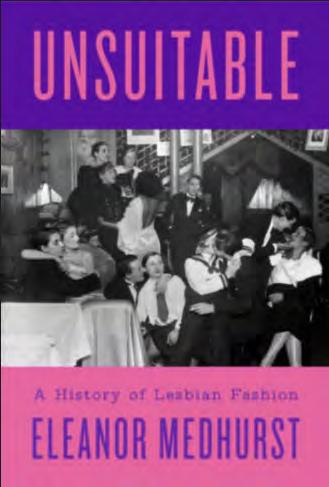
Pride
by Jim Piechota
Here’s the third and final installment of our Pride 2024 books roundup, where you’ll find a colorful selection of picture books, photo essays, and Children’s and Young Adult titles. These books make ideal conversation pieces in mixed company on the living room coffee table or on the bedside table. Have a wonderful and safe Pride month, watch out for each other, and don’t forget to patronize your local queer bookseller and pick up a few of these incredibly diverse, meticulously crafted pictorial volumes.
‘Unsuitable: A History of Lesbian Fashion’ by Eleanor Medhurst, $34.95 (Hurst & Co.)
Spanning centuries and across continents, this fascinating time capsule from queer historian Medhurst projects readers back in time in an insightful, educative history lesson in lesbian fashion.
Frameline48
Families, friends & foes in film
is a lesbian, finding support in Vicente’s best friend, Carmen, a lesbian bar owner, and getting involved with Camila, the girl her father tutors. Eva (Sasha Calle) has a strained relationship with Vicente, who favors Violeta, yet there are tensions there as well.
Life is not easy for Gen Z folk in the breezy but also depressing film, “Rent Free.” Ben (Jacob Roberts) gay, and Jordan (David Trevino), bisexual but leaning straight, are Austin, Texas besties from high school. They travel together to New
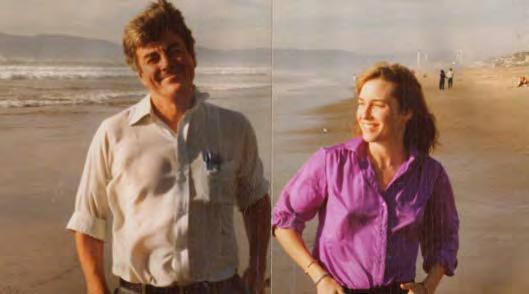
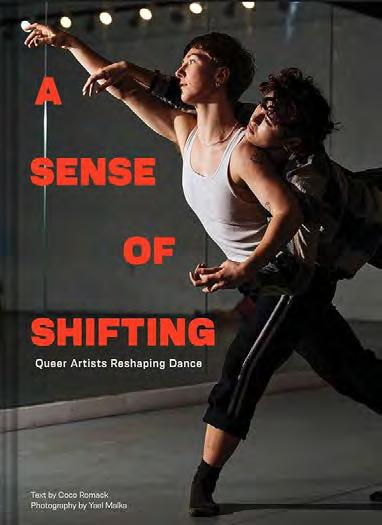
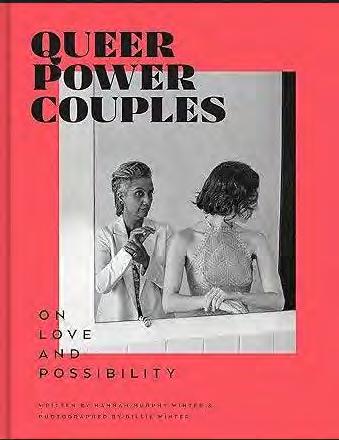
York City staying with married couple friends, seriously contemplating starting a new life and career in the Big Apple.
In a drunken stupor, Ben convinces Jordan to adopt an experiment. They will couch-surf for a year, sponging off their friend’s hospitality, living rent free, much of it in a cloud of drugs. But their best laid plans are constantly being tested, even temporarily living with Ben’s druggie father.
Audiences might want to scream at both guys, “Grow up.” Nothing great, but even though they really don’t deserve it with all their immaturity and lack of responsibility, you keep hoping things will turn out well for Ben and Jordan.
There’s no recipe for a happy marriage, even a bumpy one, like the one profiled in the documentary, “Helen and the Bear.” Helen is married to Pete McCloskey, affectionately called the Bear, the former Congressman from San Mateo County, 1967-1983. He’s best known as the antiVietnam liberal Republican who ran against President Richard Nixon in the 1972 primaries, which he lost.
See page 16 >>
comes a wonder to behold when eventually found and who is right in front of them!
There’s immense and wonderfully inclusive fun to be had amidst these pages as readers of all ages will encounter farm animals who make the sounds of other animals (a gobbling cow?!) and a blended family and newfound friends with flashy clothing that almost outshines the multi-hued coat of the Rainbowsaurus himself! This is terrific family fun.
‘A Sense of Shifting: Queer Artists
Reshaping Dance’ by Coco Romack, Yael Malka, $27.50 (Chronicle Books) Romack and Malka’s spectacular photography collaboration celebrates the artists, dancers, and choreographers who continue to defy outdated notions of what constitutes “dance” and artistically calibrated human motion. In a series of stunning images, the book captures a night at San Francisco’s Sundance Stompede and the Bay Area’s country-western, two-stepping, line-dancing, and swing-dancing community, then moves into how companies like Ballez, in response to the ballet industry’s “archaic standards,” “Feath3r Theory,” and “Kinetic Light” (disabled and nondisabled performers dancing together) brings queer and trans bodies into traditional dance canons as a “reparative act.”
Though not solely a book of photographs, there are 36 historical illustrations and pictures included and each is appropriately paired with chapters on lesbian life in Japan in the early twentieth century, to feminine tours of Paris, Berlin, and the Harlem Renaissance, and the liberation of lesbian feminist dress codes, cross-dressing, and the advent of the drag king.
Queer historians and folks with even a casual interest in the sartorial legacy of lesbian women over the last few centuries will immensely appreciate this immersive commemoration which will inspire spirited conversation and illuminative discussion.
‘Rainbowsaurus’ by Steve Antony
$17.95 (Crocodile Books)
This vivid, fanciful, 32-page read-along story by multi award-winning authorillustrator Antony (“Mr. Panda” series)
chronicles the journey of a family consisting of two dads and their three children to find the mythical Rainbowsaurus! Along the way, the family meets a kaleidoscopic array of animals who are also on their own adventure to find the creature, which be-

And those are just a small sampling of the artists, acts, and performance groups Romack places at center stage in an art book that leaps off the page with thrilling movement, human emotion, and artistic physicality. These photographs and accompanying profiles are stunning and electrically capture the intensity of motion, humanity, and queer artistic expression.
‘Queer Power Couples: On Love and Possibility,’ written by Hannah Murphy Winter and photographed by Billie Winter, $29.95 (Chronicle Books)
In the introduction to this gorgeous and memorable nod to queer relationships, author Hannah Murphy Winter and her photographer wife, Billie, remark on their first inklings of queerness as youngsters connecting on a visceral level with characters from cartoons like “Recess” and “Thundercats.” When they both came out at twenty-four, the world opened in a “slow and awkward
See page 23 >>
‘In the Summers’
‘Rent Free’
‘Helen and the Bear’
Photo essays, young adult & rainbow lit
Booksapalooza, part 3
He authored environmental legislation, especially the Endangered Species Act of 1973 and served as co-chairman of the first Earth Day in 1970. Fed up with the divisiveness of Republicans in 2007, he became a Democrat. He died on May 8 at age 96 after filming was completed.
It’s an intimate, tender, loving portrait, but it is very slow-moving, as if you are experiencing their boring routines day in and day out. It runs 80 minutes but feels much longer. Still, it’s a reassuring meditation that despite difficulties and failings, with commitment, honest communication, and hard work, relationships can survive and thrive even during crises.
Young love is celebrated as two students studying in Mexico City find each other by chance on public transportation in Juan Hernandez’s new film, “Demons at Dawn,” from Mexico. Orlando (Luis Vega) wants to be a dancer and performs at a nightclub, while Marcos (Axel Shuarma) seeks to graduate from nursing school.
The first half of this film is intoxicating as they fall in love, with some stirring dance sequences by Vega. Orlando is invited to apply for a new dance reality show, while Marcos does
well in his program. The film loses steam in the morose second half, as Orlando seems to pull away from Marcos and we really don’t know why. When they reach a crisis it’s hard to empathize with them. At 2 hours, 15 minutes this film is far too long and can’t sustain the drama, even as it attempts to recover in the final seven minutes, it’s not believable. It’s a valiant effort due mainly to the attractive palpable chemistry between Vega and Shuarma, but nonetheless a miss.
You’ve probably never heard of Jackie Shane, but you are hardly alone. The reasons for this omission is essayed in the absolutely terrific documentary, “Any Other Way: The Jackie Shane Story.” Shane was the dynamic black trans soul/R & B vocalist in the 1960s poised to become a big star. The film opens with a phone call to two nieces informing them their aunt (Shane) had died in 2019 (at age 78) and left them a storage room of vintage dresses, jewelry, and memorabilia, but most importantly an unpublished handwritten autobiography.
Because there was virtually no archival footage, Shane’s incrediblebut-true story is told in rotoscope animation done in watercolors with trans performers Makayla Walker and Sandra Caldwell, playing the older and younger Jackie. Born in 1940 seg-

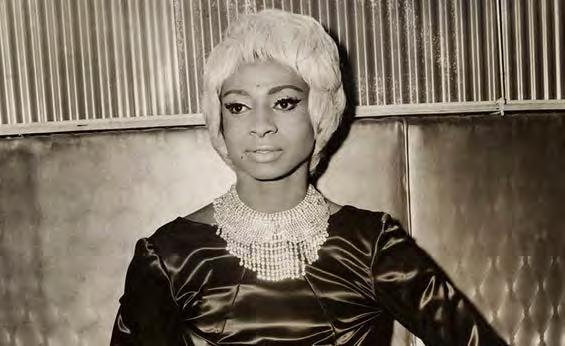
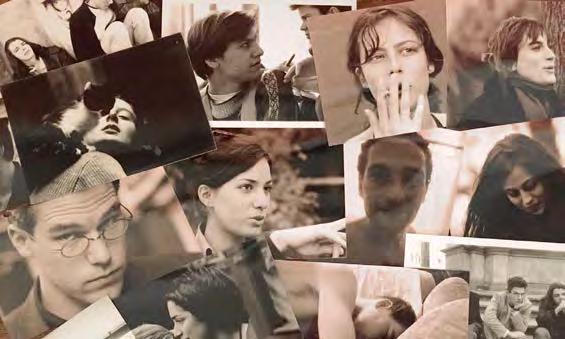
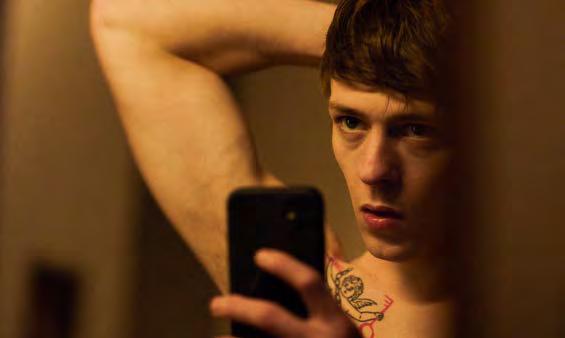
regated Nashville, she escaped to Toronto, developing a following, but she toured throughout Canada and the U.S., scoring a hit with her song “Any Other Way.”
Her story is both tragic and posthumously victorious with filmmakers Michael Mabbon and Lucah Rosenberg-Lee, making sure Shane won’t be forgotten. This film is the zenith of Frameline48.
Would you like to know what your exes really think about you and the relationship you had together? If so, you will be thrilled by the new French documentary, “Fragments of a Life Loved.” Director Chloe Barreau since age 16 has been documenting her love affairs, photographing, collecting mementos, and especially filming her lovers, often while she was still in the relationships.
She asks 12 of her exes, four men and eight women, how they remember being with her, whether it was a very short week or years. A third party filmed their responses. Barreau asks at the start of the film, “Who do our memories belong to?”
Barreau gets points for bravery in her willingness to sustain withering criticism. There are touching memories and some of her exes see their relationship with Barreau as the high point of their lives, as we are treated to some unanticipated revelations of what it means to love and be loved by others.
Max Williamson (Ruaridh Mollica) seems to have it all, a good-looking, ambitious 25-year-old writer from Scotland living in London, almost ready to publish his first book with a job freelancing at a tony monthly magazine. Yet he’s willing to risk it all in the winning British drama, “Sebastian.”
The subject of his novel is the sexworker Sebastian, which is also Max’s alter-ego name, working as an online escort with older, wealthy clients so he can find out about this work from his own personal encounters, even though he tells his publisher and writing class that it’s his interviews with sex workers that comprise his research.
He meets a new client Nicholas (a deeply affecting Jonathan Hyde), a widower whose late partner and sexuality has been hidden, meant to contrast with the secrets of Max.
However, Mollica is astounding hinting at the character’s insecurities and possible shame about his sexuality. The film features graphic sexual frankness, a necessary element here, but also paints a disturbing picture of contemporary London and the cutthroat world of publishing. “Sebastian” is an unexpected if disturbing delight.
We are enthralled by a lesbian fairy tale in “Gondola,” by German director Veit Helmer, but occurring in the European country of mountainous western Georgia. A cable car connects a village in the valley, with one gondola going up to the village, the other goes down to the valley.
This is where Nina (Nini Sosella) and Iva (Mathilde Irrmann), the conductors of each of the gondolas, meet, both dressed in air-hostess-type uniforms. A flirtation develops: they play chess, they serenade each other with music, one a violin, the other a trumpet. It blossoms into love that casts a spell over the villagers, at first hostile, but then later supportive.
To be honest, there’s not much story here, but it’s inventive, whimsical, magical, almost similar to Wes Anderson’s “The Great Budapest Hotel,” only a queer version of that film. It will enchant all viewers, especially children; a truly charming entry for Frameline48.
60% of Miami may be underwater by 2060 is just the tip of the bad news in the ecoqueer documentary, “Can’t Stop Change: Queer Climate Stories from the Florida Frontlines.” The film uses interviews with 14 LGBTQ+ artists, organizers, and educators across Florida (and its diaspora) into what is being done to combat climate change in the state.


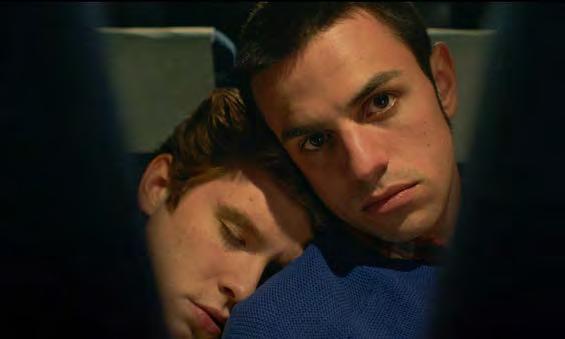

Above: ‘Gondola’
Upper Middle: ‘Can’t Stop Change: Queer Climate Stories from the Florida Frontlines’
Lower Middle: ‘Duino’
Below: ‘The Judgment’
The feature draws a strong connection between the legislative assault done to queer folk with its attack on the land, whether it be repealing environmental regulations or boosting fossil fuel industries, that the state government (under Governor Ron DeSantis) wants to get rid of LGBTQ+ people as it does any environmental protections. Of course, global warming is a threat multiplier in that it mostly impacts vulnerable communities (queer/trans; people of color), especially during disasters such as hurricanes or rising sea levels.
This documentary couldn’t be more intersectional, with native indigenous, Black, Puerto Ricans, Cubans, Haitians all represented in this land shaped by water. There is much useful information and ideas for combating climate change.
A coming-of-age doomed gay romance forms the background of the Argentinian film, “Duino.” Matias, an Argentinian filmmaker now in his forties, is struggling to edit his unfinished movie inspired by his first love to Alexander, a Swedish classmate, whom he met at an international school in the 90s. Alexander is a bit wild, even unhinged at times, but they develop a strong friendship. Alexander does something stupid and gets expelled. He returns to Sweden where his father is forcing him to attend a military school. Alexander invites
Matias to spend the Christmas holiday at his family’s estate called Duino. Alexander’s younger sister Roma is instantly attracted to Matias, but he’s coming to the realization he’s really in love with Alexander. He’s too scared to tell him and isn’t sure if it would be reciprocal.
Egypt is a place that holds multiple horrors for a gay Egyptian-American couple, returning to that country in the Gothic thriller, “The Judgment.” Mo, short for Mohamed (Junes Zahdi) and his boyfriend Hisham (Freddy Shahin), come back because Mo’s father has died and he wants to see his mother, as well as deal with his father’s business affairs, having been estranged from his parents for years. Mo came out to his mother at age 11 despite being a very religious Muslim. His mother claimed he was cursed, believing someone using witchcraft had cast a spell over him.
Hisham’s mother will help him counter the evil witchcraft by using witchcraft, which begs the question that all this evil done against Mo isn’t that just as evil as being gay? Will Mo be liberated from his childhood terrors and deep religious fears? With stunning cinematography, it morphs into a horror story, but the horror is less one of magic spells than of human bigotry and narrow-mindedness.
16 • Bay area reporter • June 20-26, 2024 t << Film << Frameline 48 From page 15
Above: ‘Demons at Dawn’
Upper Middle: ‘Any Other Way: The Jackie Shane Story’
Lower Middle: ‘Fragments of a Life Loved’
Below: ‘Sebastian’
See page 17 >>
Song and dance in Sonoma
by Jim Gladstone
“We may do a song from ‘Phantom of the Opera,’ but there’s no way we can have a giant chandelier come crashing down from the ceiling,” said Tony Gonzalez, the artistic director of Transcendence Theatre Company.
“Our stage is set up in the middle of a field. As far as scenery goes, we have the sunset and then a sky full of stars. That’s spectacular in its own way, but it’s the talent that really carries these shows.”
The talent, stellar in its own right, consists of dozens of singers and dancers who regularly appear on Broadway and West End stages but sweep into Sonoma County in several waves each summer. This weekend marks the opening of the company’s 14th season.
Four celebratory new song-anddance shows will each have fournight runs at the 900-capacity Field of Dreams, located two blocks from the Sonoma town plaza.
From June 20-23, “Summertime” delivers a bumper crop of seasonallythemed numbers, ranging from the Beatles’ “Here Comes the Sun” to “Let the Sun Shine In,” from “Hair.”
July 25-28 brings “Don’t Stop Us Now,” a collaboration with two vocal groups led by Transcendence alumni The MidAtlantic Men and Queenz of Rock, who have appeared in nightclubs and on cruise ships around the world.
Motown and R&B get the spotlight in “Dancing in The Streets” from August 15-18.
And beloved show tunes are featured in “A Sentimental Journey” from September 19-22.
Broadway West
Transcendence performers, all members of Actors’ Equity, arrive in town two to three weeks in advance of each production for rehearsals which, though intense, offer a markedly different mood and environment from the studios and stages of big city theater.
“We started this because wanted to be able to do great musical theater work without the hustle and lifestyle of New York, LA, or Chicago,” said Amy Miller, the veteran Broadway dancer who co-founded Transcendence with her husband Brad Surosky. The couple settled in Sonoma County following stints doing television and film work in Los Angeles.
“It’s a whole different feeling here,” Miller said in a recent interview with the Bay Area Reporter, explaining that the revue format of most of Transcendence’s productions allows singers and dancers “to perform as themselves.”
“They’re singing and dancing to songs that they love,” said Miller, “They’re not playing roles. You can really recharge your batteries as a per-
<< Frameline 48
From page 16
“Out” is a deeply personal film from The Netherlands about struggling with group norms when you are young and gay, not sure about where you are going. At least Tom (Bas Keizer) and Ajani (Jefferson Yaw Frempong-Manson) who are closeted secondary classmates and lovers, know they need to get out of their conservative rural town and head for gay Paree, which in their case, is Amsterdam. They want to pursue their dream of becoming filmmakers, especially Tom as a director.
They get accepted into the film academy, but Tom doesn’t quite fit in, despite being talented. He feels and presents himself as an outsider. He’s kicked out of school for not connecting with the other students, which brings to mind E.M. Forster’s dictum from “Howard’s End,” only connect.
Made in black and white with a sensual cinematography, “Out” feels like a documentary character study, mainly
Transcendence Theatre Company kicks off summer under the stars

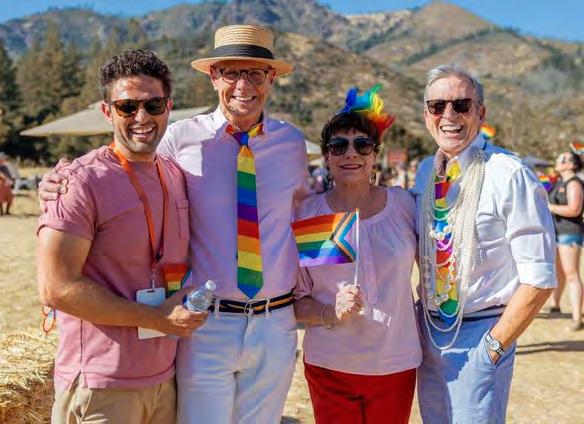
Left: A 2023 Transcendence Theatre Company show included excerpts from the musical ‘Hair’ Right: Transcendence Theatre Company’s 2023 Pride Night.
former coming out here and having a chance to express yourself creatively.”
While many Transcendence cast members fit Sonoma in between other jobs, it’s not uncommon for performers from long-running Broadway shows to take leaves for several weeks in order to join old friends and former colleagues in a sort of artistic retreat with Transcendence.
Connecting communities
“We call ourselves ‘dots,’” Miller said. “And putting together each summer’s casts is like a big game of connect the dots. I was the dot that connected to Tony.”
Gonzalez, who was in the Broadway cast of “Mamma Mia!” and still
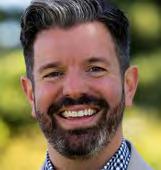
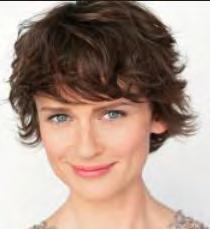
Above: Transcendence Theatre Company Artistic Director Tony Gonzalez Below: Transcendence Theatre Company cofounder Amy Miller
makes his home in New York, first collaborated with Miller when they were undergraduates in the music theater department at Ohio’s Otterbein College in the 1990s.
Over the years, word of mouth about Transcendence has spread throughout the New York theater community. This summer’s casts will include performers who’ve been featured in “Sweeney Todd,” “Harmony,” and other Broadway productions this past season.
“This isn’t just another gig,” said Miller. “The performers and other creatives who come here want to have the experience of performing outdoors, of working with people they know and admire, and of getting involved with the local community.”
Community engagement, such as master classes with young people, visits to senior centers and healthcare facilities, and programs with Sonoma County’s LGBTQ+ Center, Positive Images, is part of performers’ contract agreement when they sign on to participate in a Transcendence production.
Bring on the gays
“When I initially came to Sonoma to perform with Transcendence in 2014,” Gonzalez told the Bay Area Reporter, “I was definitely wondering what it would be like to be out here as a gay man. But over the years, I’ve met so many great gay couples in the area who have become big supporters of Transcendence. There’s a couple we call ‘The Dads’ who we love to spot in the audience during our shows.”
In addition to bringing remarkably polished entertainment to a region adored by tourists but famously light on nightlife, Gonzalez said the annual descent of Transcendence talent creates a small but notable uptick in wine country’s queer population.
“The energy at the gym here definitely changes when our casts arrive in town,” he quipped.
Gay music theater fans from throughout the Bay Area have long

centering on Tom, as he and Ajani drift apart. Keizer is out-standing, conveying well both Tom’s insecurity and boldness in discovering who he is, which seems to involve mostly dedication to his art. Punchy and absorbing, “Out” is a pleasant surprise.t
Read the full reviews, with trailers, on www.ebar.com.
www.frameline.org
been a part of Transcendence’s core audience, many combining a performance with winery tastings, restaurant sampling, or spa treatments as part of a weekend getaway.
“We had our first Pride night last year,” said Gonzalez, “And it attracted a lot of younger people who hadn’t seen one of our shows before.”
Transcendence’s second annual Pride celebration will take place at the August 17 performance of “Dancing in The Streets,” in collaboration with Face to Face, the Sonoma County AIDS Network.t
Transcendence Theatre Company, Field of Dreams, 151 1st St., Sonoma (877) 424-1414 transcendencetheatre.org

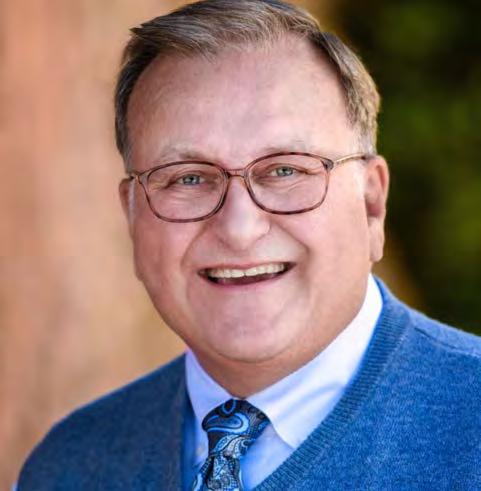



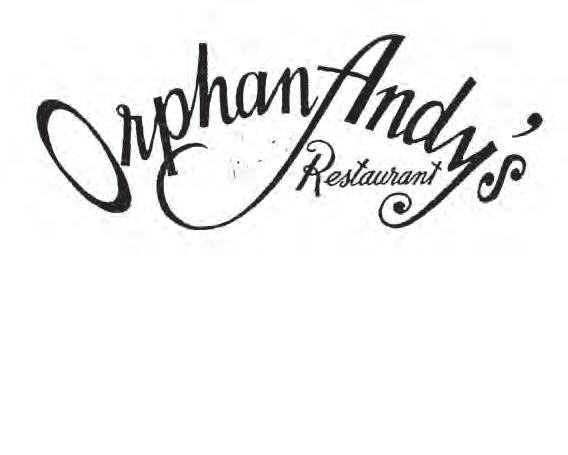

June 20-26, 2024 • Bay area reporter • 17
t Theatre >> StevenUnderhill 415 370 7152 • StevenUnderhill.com Professional headshots / profile pics Weddings / Events 3991-A 17th Street, Market & Castro 415-864-9795 Proudly serving the community since 1977. Open Daily! New Adjusted Hours Monday 8am (last seating 9:45pm) Tuesday 8am (last seating 9:45pm) Wednesday 8am (last seating 9:45pm) Thursday 8am Open 24 Hours Friday Open 24 Hours Saturday Open 24 Hours Sunday 7am (last seating 9:45pm)
‘Out’
Transcendence Theatre Company Brennan Spark
Nicholas Phan’s ‘A Change Is Gonna Come’
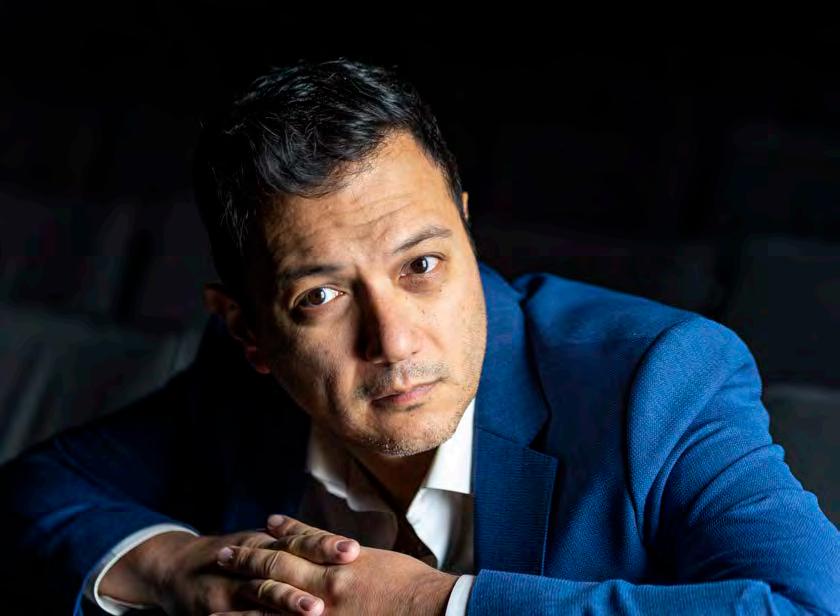 by Tim Pfaff
by Tim Pfaff
As I listened, repeatedly, to Nicholas Phan’s new CD, “A Change Is Gonna Come” (Azica Records), a collection of American protest songs, it occurred to me that it’s been a while since I’ve heard someone’s singing called “honest.” Admittedly, it’s a hard criterion to nail down, but the fact that you know it when you hear it is at the heart of the matter.
It’s also been a while since I’ve called a tune “catchy,” the hallmark of a good protest song. But the dozen songs on this new album –by composer-musicians from Malvina Reynolds and Sam Cooke to Phil Ochs and Joni Mitch-
ell– come like manna from heaven to anyone who is unusually susceptible to earworms. Having these songs in your ears will turn an ordinary walk into a brisk march. The temptation will be to sing them out loud.
Of course, the out, San Franciscobased Phan, as honest a musician as walks among us, does the singing part better than even his most ardent fan could. But the sheer energy in his new project –itself said to be a long time comin’, and in the event a triumph of devotion over documentation– is infectious.
Just in time, you might add. There’s a pivotal election on the near horizon, and a message of this new CD is
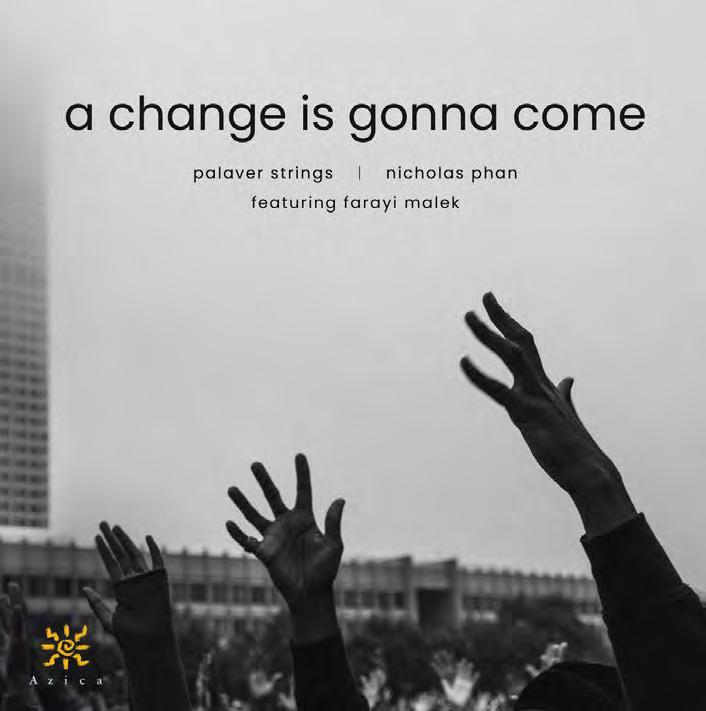
its implied invitation to all who love freedom, to make their feelings not just heard but loved, their demands as unforgettable as they are unassailable.
Freedom on the march
It’s telling that for the most part the songs on this album are historical. But their importance is that they’ve also proved lasting.
The pro-democracy movement in Hong Kong may have failed, at least for now, but it was sustained by a song, “Glory to Hong Kong,” written for the protests and composed for singing by musical amateurs. “The People United Can Never Be Defeated” has outlasted the Chilean action for which it was
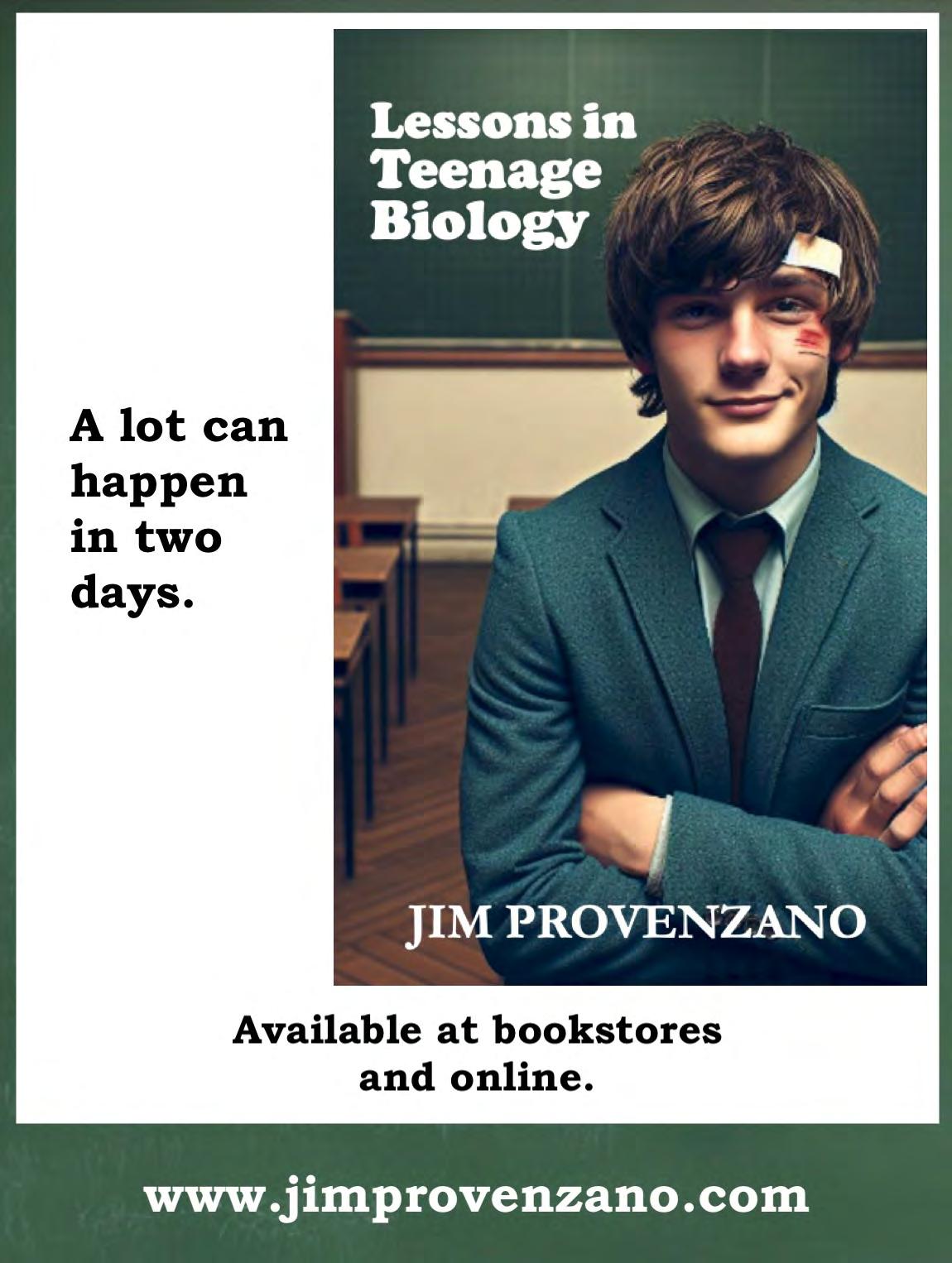
composed to become the international ur-protest song, as familiar around the world as the Twentieth Century Fox movie intro.
In America, Bob Dylan’s “Blowin’ in the Wind” takes pride of place for sheer endurance and manifest singability. The new disc opens with it but in an arrangement for string ensemble, without voice, that is striking for its immediate recognizability while creating a sound world all its own. The fresh, galvanizing sound of the Palaver String Ensemble makes for a musical partnership that goes far beyond accompaniment.
The winds of change having blown, Phan immediately weighs in with Phil Ochs’s “What Are You Fighting For,” dispatched with the high tessitura that shows his voice at its most beautiful. What stands out in this new release is the hard-won freedom in Phan’s singing itself. With no compromise of its characteristic, meticulous musicality, it’s wild. The voices in the songs are those of people with no desire to take to the recital stage, and Phan finds the right accent for each.
The singing is free-wheeling, often indulging in the shifts of vocal register that move freely between “normal” voice, head voice, and all-out falsetto.
Call some of it crooning if you must, but what could be more reflective of the American DNA than a good croon?
A career breathing life into Schubert’s strophic songs and the folksong settings of Benjamin Britten has made Phan a master of putting over songs with multiple verses. In “What Are You Fighting For?” Phan captures their increasing intensity.
There’s the call to attention in “You tell me there is danger in the land you call your own.” What follows is a warning: “Then listen to your leaders, the ones who won the race, as they stand right there before you while lying to your face. If you ever try to buy them, you know what they stand for. I know you’re sympathizing, but what are you fighting for.”
Then it lands on its message, sung with extraordinary tenderness by Phan: “But the hardest thing I ask you, if you will only try” is to look into the eyes of children to see what’s worth fighting for. “If you win the war at home, there’ll be no fighting anymore.”
Achingly beautiful.
When Phan launches into “I Dreamed I Saw Joe Hill last night,” Earl Robinson’s lines are reborn. Its new if imagined sightings of the labor activist arrested and himself accused of murder become increasingly visionary, with Phan at his yearning best. I wouldn’t have thought I needed to
hear Pete Seeger’s “Where Have All the Flowers Gone” ever again, but Phan begins it a capella and on a thread of silvery sound that swells naturally through the rest of the song.
Everything old is new again
Alongside the greatest hits are other less-well-known songs of the past and some daring new ones to meet the challenges of the future. Malvina Reynolds’s “It Isn’t Nice” spits out some bitter ironies; Phan retains their sting but also accents their innate humor.
Of the composers represented, perhaps none is better known today than Joni Mitchell, though “Fiddle and the Drum” is hardly among her most famous tunes. Phan convincingly captures its dialogue between the fiddle of domestic bliss and the drum with its sticks beating out the rhythms of war. Character is a dominant element in all these songs, and Phan never passes on an opportunity to enact it, not just with carefully spoken words but with genuine, personal feeling.
“Strange Fruit,” closely associated with its renditions by Billie Holiday and Nina Simone, gets an arrestingly fresh reading by a guest singer, mezzo-soprano and jazz vocalist Farayl Malek, who bores deeply into the savagery of Southern lynchings in a remarkable new arrangement by Jonathan Bingham. The album ends with her penetrating performance of the title track, Sam Cooke’s “A Change Is Gonna Come.”
Midway Phan weighs in with two songs, commissioned for the album, by Belize-born, England-based Errolynn Wallen. Her lively, uproarish anti-war song, “Boom Boom,” gets the deluxe treatment by the vocally versatile Phan, while her more direct “Song for the People” is dispatched with all the colors in its percussive, often literally monotone declamation.
“A Change Is Gonna Come” is as much an invitation as a historical artifact. With the very real prospect of the hard-won gains in gay rights being reversed, now, there’s a pressing need for change to come again. Readers of a certain age will remember when the now-month-long Gay Pride celebration was best known for its march of a parade and called “Gay Freedom Day.” The songs on Phan’s album, drawn from earlier but equally tumultuous times, share their resounding plea for freedom.t
Nicholas Phan, “A Change Is Gonna Come,” with the Palaver String Ensemble and guest vocalist Farayl Malek. Azica Records, CD and streaming. www.azica.com
18 • Bay area reporter • June 20-26, 2024
t << Music
Nicholas Phan
Merola Summer Festival
by Philip Campbell
For the first time in 67 years, San Francisco’s treasured Merola Opera Program has made women the three stage directors for the 2024 season. Always known for diversity and inclusion, it is a surprising and welcome first. The organization’s upcoming Summer Festival features two celebrated alums and this year’s participant Stage Director- all women.
Rightfully recognized as the foremost U.S. training program for aspiring singers, pianists, and stage directors, Merola is a true meritocracy.
International and American stars of tomorrow learn their craft through master classes and private coaching with well-established conductors, singers, and directors.
Offered free of charge to all, it is the only young artist program to provide financial support for five years following participation. Since powerhouse opera administrator Carrie-Ann Matheson (San Francisco Opera Center Artistic Director) and Certified Life Coach Markus Beam (Merola ’02; San Francisco Opera Center General Manager) formed the new Merola artistic team in 2021, the program has been renewed and augmented.
The 2024 Merola Summer Festival starts June 27 with an evening of vocal chamber music at the intimate Dianne and Tad Taube Atrium Theater, on the fourth floor of the Beaux Artsdesigned Veterans Building. Equipped with the remarkable but virtually undetectable Meyer Sound Constellation Acoustic System, the venue is perfect for smaller events.
“The Song as Drama” highlights the narrative arc of song with selections from various eras and styles. Artistic Director Carrie-Ann Matheson and famous out and glad to tell you Bay Area tenor Nicholas Phan (a noted Bach and Benjamin Britten performer and musical educator) will co-curate the recital.
The San Francisco Conservatory of Music Caroline H. Hume Concert Hall, just blocks from SF Jazz and Davies Symphony Hall hosts the next Festival event, The Schwabacher Summer Concert July 11 and 13.
The show features semi-staged scenes from operas by Donizetti, Gounod, Leoncavallo, Massenet, Puccini, and Richard Strauss performed with a full orchestra conducted by Louis Lohraseb. Omer Ben Seadia (Merola ’14) and Anna Theodosakis (Merola ’24) are stage directors.
Merola next presents a fully staged production of Mozart’s glorious “Don Giovanni,” with two performances August 1 and 3 at the SF Conservatory Caroline H. Hume Concert Hall. The director is none other than jubilantly out soprano and worldrenowned singing actor Patricia Racette (Merola ’88).
Regulars of the San Francisco Opera are well aware of her extraordinary musical and theatrical talents. Her once-in-a-generation Cio-Cio-San (“Madama Butterfly”) remains indelibly etched in memory. The dark and complicated passion of the devilish Don should be mother’s milk to her and the former Merola superstar has an opportunity to give back.
Merola artists will perform all roles. Stefano Sarzani, an active educator, conductor and, pianist will make his Merola debut on the podium.
The season concludes August 17 with the Merola Grand Finale, a gala concert featuring the 2024 Merola participants, presented at the War Memorial Opera House. A reception with the artists in the Green Room at the War Memorial building follows the performance (separate admission).
All 29 talented youngsters from across the United States and Canada, as well as Australia, China, France, Georgia, and South Korea, who were selected from more than 1,300 international applicants, join in a musical

feast of famous operatic works and lesser-known gems.
Maestro Steven White, praised as a conductor who “squeezes every drop of excitement and pathos from the score,” and 2024 Merola Stage Direc-
tor Anna Theodosakis are in charge of the production.
It only takes one taste of the ‘Merolini’ spirit to become an enthusiastic supporter. The participants simply wouldn’t be there if they didn’t deserve
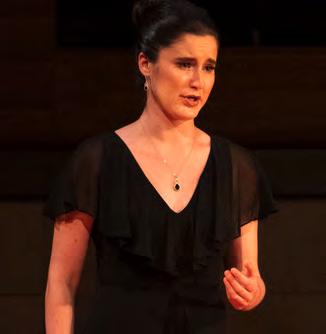
it and their level of professionalism and musical brilliance is awesome.
There is a certainty you will be catching some rising stars.t San Francisco Conservatory

of Music, 50 Oak St. Dianne and Tad Taube Atrium Theater, 401 Van Ness Ave. War Memorial Opera House, 301 Van Ness Ave. www.merola.org June 20-26, 2024 • Bay area reporter • 19
make history in classical music concert series t Music >> LAST CALL! FINAL ADVERTISING DEADLINE IS FRIDAY, JUNE 21 at 12NOON CALL (415) 829-8937 OR EMAIL ADVERTISING@EBAR.COM RESERVE YOUR SPACE IN OUR JUNE 27 SAN FRANCISCO PRIDE EDITION NOW!
Women
Left to Right: Mezzo-sopranos Simona Genga and Lucy Joy Atlus (both Merola ‘23) return with the young artists selected for the 2024 Merola Opera Program.
Both photos: Kristen Loken
‘Big Boys,’ big feelings
 by Gregg Shapiro
by Gregg Shapiro
Corey Sherman’s feature-length directorial debut, “Big Boys” (Dark Star Pictures), is like Jane Schoenbrun’s “I Saw the TV Glow” in that it is a raw and visceral depiction of being a teenage outsider. The difference is that there is no pretension here, and
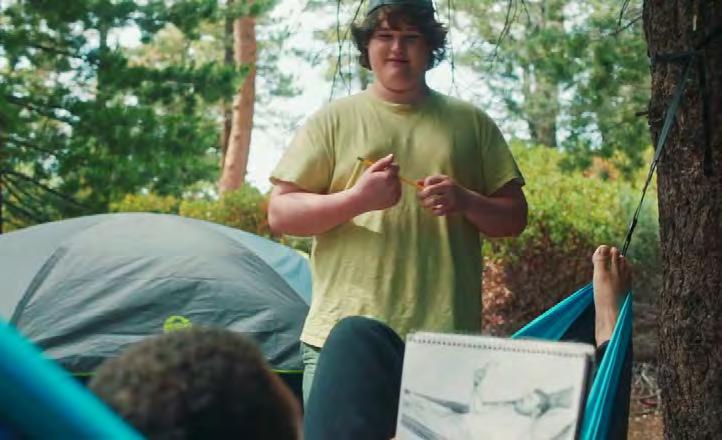
barbecuing front of their house across the way. He’s also the kind of nervous kid who makes a list of items necessary for a first aid kit in advance of a camping trip. He lives with his self-assured older brother Will (Taj Cross) and mother Nicole (Emily Deschanel). Jamie’s excitement about the aforementioned camping trip with Will and interest in sports. At the campground, Jamie asserts his independence when it comes to unpacking the car, but he gets easily winded. His insistence on assembling the tent he’ll share with Will results in a piece getting broken.
Nevertheless, once Jamie gets comfortable, we can see that he’s capable of enjoying himself. He goofs around in



But Jamie’s awkwardness surfaces when he and Will sneak out to meet a couple of girls from another campsite. Back at the campsite, an encounter with Dan leads to a pep talk for Jamie “from one younger brother to another.” Once in his sleeping bag, Jamie’s dreams are filled with erotic situations featuring Dan.




loves video games, and doesn’t lisp, as if he’s trying to prove he’s not gay.
But a hike in the mountains, in which Jamie and Dan get lost, takes the story in an increasingly dramatic direction (even though it’s being billed as a comedy). The pivotal scene when Dan bandages Jamie’s leg with his shirt after he took a spill, is especially pow-



2017 Media Kit

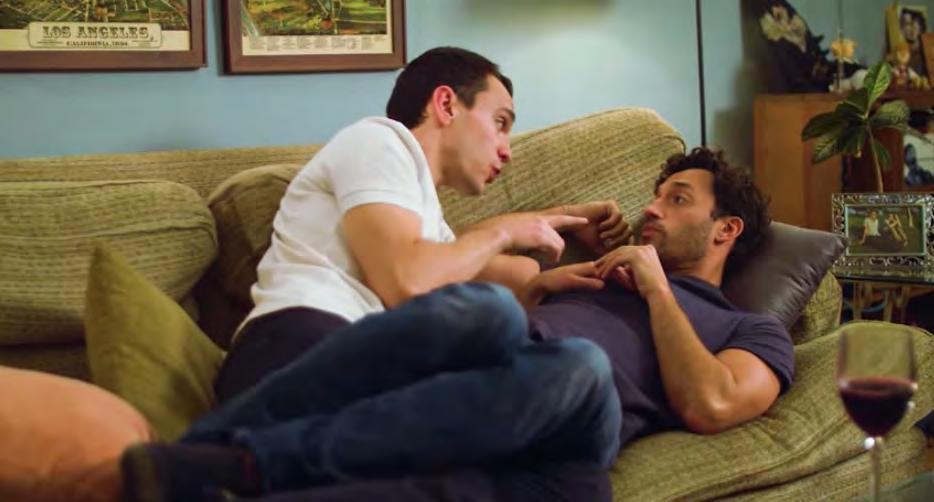
The Los Angeles Blade covers Los Angeles and California news, politics, opinion, arts and entertainment and features national and international coverage from the Blade’s award-winning reporting team. Be part of this exciting publication serving LGBT Los Angeles from the team behind the Washington Blade, the nation’s first LGBT newspaper. From the freeway to the Beltway we’ve got you covered.

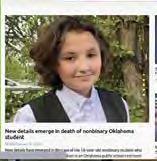
20 • Bay area reporter • June 20-26, 2024
t << Film & TV
Left: Isaac Krasner and David Johnson III in ‘Big Boys’ Right: Isaac Krasner and David Johnson III in ‘Big Boys’
Both photos: Dark Star Pictures
0
‘Let the Canary Sing’
by Brian Bromberger
When one recalls 1980s musical culture, the name Cyndi Lauper almost comes immediately to mind, perhaps second to her rival, Madonna. Her hit song, “Girls Just Want to Have Fun,” with its accompanying video (viewed one billion times on YouTube), was not only one of the defining pop tunes of that era, but has become a third-wave feminist anthem.
The documentary “Let the Canary Sing” a nostalgic look at her life and career, is currently streaming on Paramount +, directed by Alison Ellwood, who four years ago made an excellent film about “The Go-Go’s.” While well-intentioned and intermittently fascinating due to its subject, Canary in comparison seems safe and staid. Financed by Sony, Lauper’s record company, as well as the sponsor of her upcoming Girls Just Want to Have Fun Farewell Tour, at times the documentary seems like an infomercial.
Lauper was not an overnight success and was 30 when her first album “She’s So Unusual,” (including the controversial hit “She Bop” about masturbation) became a global sensation in 1983. Now 71, Lauper is willing to reflect back on her past work, but gives only a small peek.
Born to a Sicilian family in Brooklyn and raised in Queens, her famous thick, distinctive Noo Yawk accent is well-earned. But her parents divorced early in her life, her mother remarried to what became an abusive stepfather. Her older lesbian sister and best friend Ellen had left the family years earlier.
At 17, a wild, drug-using Lauper escaped and went to live with Ellen in New York City. She began playing in cover bands, imitating her idol Janis Joplin, but almost harming her voice in the process.
In 1980 she became a singer for the band Blue Angel, a Blondie-wannabe that missed the New Wave era of the 1970s. Her volcanic presence on stage and near operatic voice led to pleas for her to go solo. She acquired a new manager David Wolff, but in order to get

free, she had to sue her previous manager, who virtually bankrupted her. The case wound up in court, but the judge ruling in her favor at the end of the trial, pronounced, “Let the canary sing.”
Oh, girls Lauper didn’t write “Girls Just Want to Have Fun.” It was a rock song by Robert Hazard in which he fixates on all the women with whom he’d like to sleep. When producer Rick Chertoff suggested the song to Lauper, she screamed no, the lyrics were too sexist and male-centric. But she revamped it from a female point of view, that fun meant freedom because girls want to have fun the same way men do, but also as a way for women to be liberated from societal expectations and workplace demands.
When it was released as a single in 1983, it went nowhere until Lauper cannily allied herself with the professional wrestler Captain Lou Albano (he played her father in the song’s video) as well as this very popular sport and then it began soaring to the top of
the charts.
Besides her impressive voice, she adopted a street-kook persona, her style creating her public image almost like a visual art form with her candycolored hair, decoupage thrift shop layers of vintage clothes, earrings, bangles, and fishnet stockings. This persona was as carefully engineered as her albums. Her flair serendipitously coincided with the birth of MTV videos, of which she became adept. She was also the first to insist her videos be close-captioned. In 1985, she won the best new artist Grammy award.
Her second album, “True Colors,” three long years later, was a critical and financial success, selling seven million copies, featuring the hit song “True Colors,” written in grief after one of her best friends died of AIDS. The song has become a gay anthem.
Boots
Her third album was a critical and financial disappointment. She released ten more records, including blues, country, American songbook


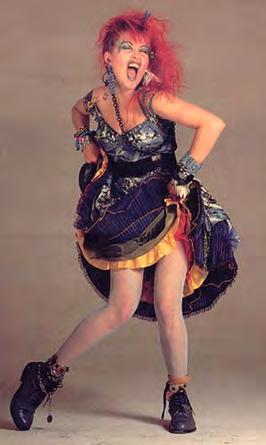
standards, dance albums, yet none of them were successful. Her biggest accomplishment came when gay playwright Harvey Fierstein, who wrote the book for the Broadway musical “Kinky Boots,” about a struggling shoe factory trying to save itself by making boots for drag queens, asked her to write the music and lyrics. She won a Tony award, becoming the first woman to win solo, for Best Original Score. The documentary, which features no criticism of her and certainly no self-criticism, seems designed to remind audiences about her previous work, so they will attend her greatest hits tour concert, her final one, which one supposes will provide a nest egg for her retirement. There are hints about how Cyndi Lauper became

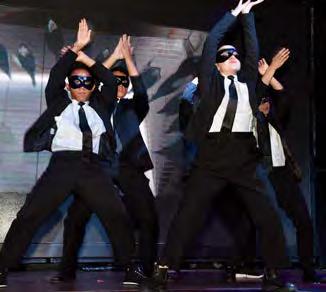
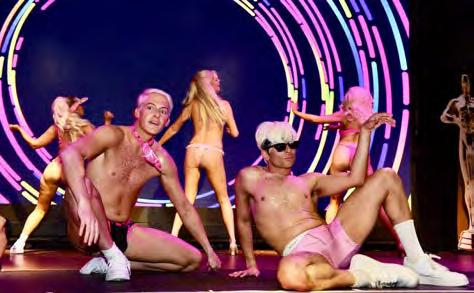
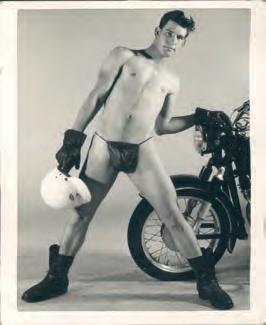
Cyndi Lauper, but nothing about how her public image might have become an albatross artistically.
You get the impression you are never seeing Lauper’s true colors. This is a shame, because she’s a remarkable unconventional woman with a generous, compassionate heart, but also has definite ideas about what does and doesn’t work musically, so even her flaws would be instructive. But her willingness to be vulnerable is limited.
As she says in the film, “Who the hell I am is who the hell I am.” And with such bluntness, queer audiences always appreciative of her support and advocacy, are likely to say that’s more than enough.t
www.cyndilauper.com
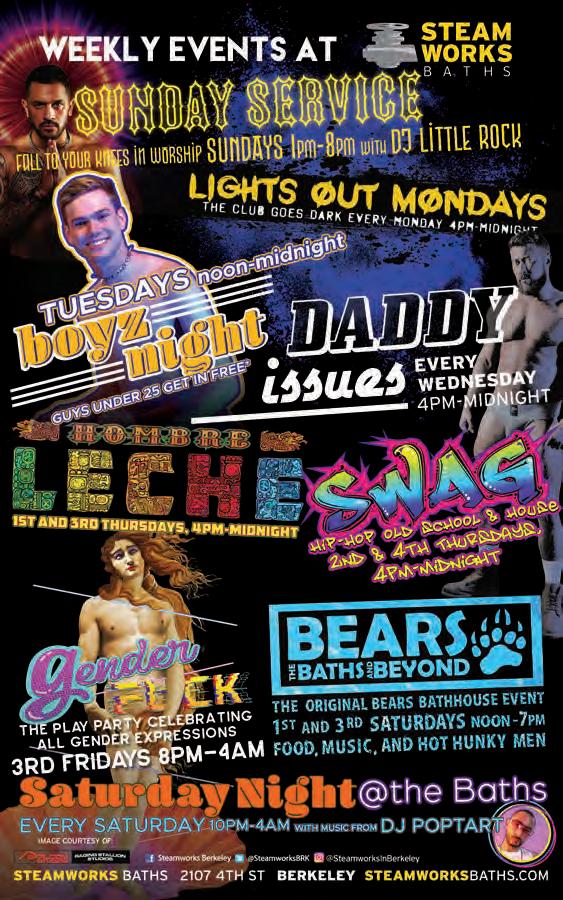
June 20-26, 2024 • Bay area reporter • 21
Cyndi Lauper’s life and career in new documentary t Film & Events >> AUTO EROTICA PURVEYOR OF VINTAGE PORN MAGAZINES • BOOKS • PHOTOGRAPHS 4077A 18th St. OPEN EVERY DAY 415•861•5787{ { AUTO EROTICA PURVEYOR OF VINTAGE PORN MAGAZINES • BOOKS • PHOTOGRAPHS 4077A 18th St. OPEN EVERY DAY 415•861•5787{ { AUTO EROTICA PURVEYOR OF VINTAGE PORN MAGAZINES • BOOKS • PHOTOGRAPHS 4077A 18th St. OPEN EVERY DAY 415•861•5787{ { WE BUY & SELL GAY STUFF! MONDAY-SATURDAY
Cyndi Lauper
Above: Cyndi Lauper in the documentary ‘Let the Canary Sing’
Below: Cyndi Lauper in the 1980s
Broadway Bares SF’s seventh annual sexy benefit burlesque show, this year themed “Filmstrips” and held June 16 at 1015 Folsom, included guests from the cast of the upcoming local production of the musical “Evita,” the Broadway tour of “Company,” and singer David Hernandez. Film take-offs (literally!) included tributes to “Barbie,” “The Graduate,” “The Rocky Horror Picture Show,” “Back to Future,” Bond films, and even “Mad Max.” www.broadwaybaressf.org For more photos, visit https://www.facebook.com/lgbtsf.nightlife and and https://www.stevenunderhill.com/ For upcoming nightlife and arts events, see Going Out each week, only on www.ebar.com. Broadway Bares SF VII
Photos by Steven Underhill
Christian Gullette’s ‘Coachella Elegy’
by Mark William Norby
If Pride is a time for celebration, it’s also a time of reverence and remembrance. San Francisco poet Christian Gullette’s “Coachella Elegy” (Trio House Press) carries a deep spirit of what those two words mean, both emotionally and poetically.
Gullette is inspired by what is read herein as the compression of a short line or two lines in a couplet held in tension and “how that can amplify an image or feeling,” Gullette told the Bay Area Reporter. He likes what is known in poetry as enjambment: the continuation of thought in the last line of a stanza (a group of lines forming a metrical unit in a poem), to the first line of the following stanza. You can think of enjambment as emotions that go together from one line to the next:
“Christmas Elegy”
Bound in twine and last on the lot, frozen and tubercular tree against the fence.
A makeshift hotel Christmas, brought to my brother, unable to leave his reform school for bad behavior.
untied and left to thaw in the tub, the tree burst overnight—
an evergreen heave, evangelical in its smell which filled the lobby
and almost got us kicked out.
We spent the night looking at lights on mansions in the Provo hills where there were songs and warm babies.
Gullette works partly in the Greek and Roman poetic styles known as the elegiac couplet. Gullette and his partner Michael live fulltime in San Francisco. Michael was diagnosed with cancer in 2007 and together, the two triumphed over the illness. “Coachella Elegy” is Pride in being queer. It is the remembrance of healing we all must travel, which is itself a reverential experience:
“Palm Springs”
We drink Fernet by ironic sculptures under misters that make our bangs damp.
It’s our anniversary, though that time feels faint.
We are searching for a place to escape his diagnosis, laws against gay marriage, Our leaky, flat roof.
Every Memorial Day and Labor Day, we go to the desert.
Sometimes also the Fourth of July
Palm Springs unwinds things. We almost buy that
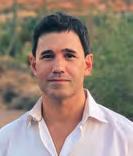

mid-century chair,
proud of our rule that love for it needs to be immediate.
At the Parker, a guy with a calf tattoo brings drinks.
You can ask for anything here. We toast to another year without cancer.
After dinner, we wander the hotel hedge maze, nowhere to go this late but home.
The book is sprinkled with poems set in San Francisco. As a part-time instructor of the Swedish language at UC Berkeley, as well as a translator of that challenging language, Gullette hones his eye on our great city:
“Stern Grove”
Summer in Stern Grove amphitheater
Coyotes live atop its wooded rim
One got poor Bella the shih tzu.
They dig dens on Mt. Davidson under a giant cross.
It’s in a scene from “Dirty Harry,”
In a YouTube video, a man points a gun at a coyote hole.
The cross used to light up at night.
FDR himself lit the lights all the way from Washington.
Vigilantes pledge law and order in
KB Brookins’ ‘Pretty: A Memoir’
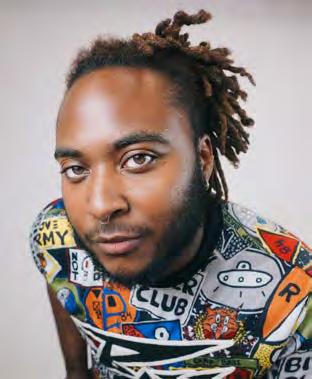
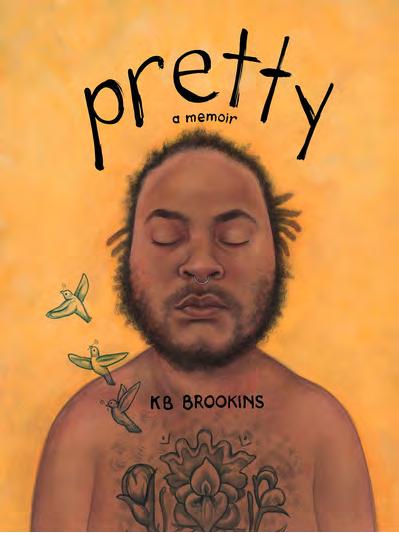 by Laura Moreno
by Laura Moreno
“Pretty: a Memoir,” published by Alfred A. Knopf, is the kind of memoir KB Brookins wishes they’d been able to read while transitioning. The book is dedicated to highly segregated Texas, where the author grew up, and to all the bois (Black butches) who never got to be boys.
KB Brookins previously authored two award-winning poetry collections: “Freedom House” and “How to Identify Yourself With a Wound.”
A poet, writer, educator and cultural critic, Brookins, 28, has an upbeat personality that shines through.
Brookins is currently a graduate student at UT Austin, a PEN America Fellow, a 2023 Creative Writing Fellow with the National Endowment for the Arts, and founded two nonprofit organizations in Austin: Interfaces, which addresses the problem of accessibility of all kinds, and Embrace Austin. Their life is the subject of an upcoming documentary that will premiere at the 2024 BFI Flare: London LGBTIQ+ Film Festival. Their writing is candid, hope-
ful, uplifting, and very informative, and features soulful poetry and photos from throughout Brookins’ life. “Pretty” is one of a number of eye-opening transgender memoirs recently published. This book in particular is a quest for understanding and acceptance that hopes to inspire much-needed change.
What is it like to grow up queer in Texas, a place known for keeping a firm hand on the wrong note? The memoir vividly brings to life their upbringing in a Dallas neighborhood with a 40% poverty rate.
“Segregation never really ended” in Texas, Brookins writes, but today it’s self-segregation. As the country progresses, Texas never really modernizes; it just gets weirder. Brookins reports that in Ft. Worth, gay bars were raided on the 40th anniversary of Stonewall, injuring people peacefully enjoying a pint. But Brookins knows that once you leave, you miss the sweet BBQ.
“I should be able to define myself, but I am not. Not by any governmental or cultural body,” Brookins reveals. “Pretty” is filled with insight
into this society’s fear of Black men, a fear so intense it truly took Brookins by surprise after they transitioned. But in the author’s experience, it’s not Black men one must be wary of. At age 5, “three teenage American boys” sexually assaulted them, not four, and not at church, as reported in Kirkus Reviews.
Nonetheless, the irrational fears of white people are a major reason these two years since transitioning have been the hardest years of Brookins’ life. They have been years of social trauma.
“Every day, I negotiate the space between who I am, how I’m perceived, and what I need to unlearn. People have assumed things about me, and I can’t change that. Every day, I am assumed to be a Black Ameri-
can man, though my ID says ‘female,’ and my heart says neither of the sort. What does it mean, to be a girlturned-man when you’re something else entirely?”
To be sure, the experience has given the author a deeper understanding of the trials their father must have had to endure.
Perhaps the most important new theme in “Pretty” is the near-constant battles Brookins faces as a trans person. They call the resulting feeling “trans fatigue,” defined as “the everyday fatigue of being trans in an embarrassingly cisgender world.”
“Transness is forty-nine lawmakers in forty-nine states wanting your carnages and spirit dead cause you dared to be yourself,” Brookins writes.
But the problems don’t end with
convention speeches.
We bungee-cord the trash bins on Mondays.
A coyote stops to sniff them.
A deep scar says it has fought a rival.
I think of it curled in the chaparral under the cross like a nativity scene from my childhood.
Note the one-line stanzas and the flow with which Gullette has connected one line to the next: enjambment. His poems are always elegies to memories that pay reverence to times past.
In this light, we remember at Pride the work our forebears have undergone to give us such a precious gift like greater freedom. What more could we ask for, what more can we give back in the spirit of remembrance of their work?
Like Gullette’s marriage to Michael in 2012, we have freedoms only dreamed of fifty-five years ago when Pride celebrations began after Stonewall.
In this same vein, Trio House Press is giving fifty percent off all of their titles during the month of Pride. You can preorder “Coachella Elegy” before the book’s release as a gift to yourself or a loved one.t
Christian Gullette’s book launch will be at Green Apple Books, in-person and on Zoom, in San Francisco on July 16, 7pm, 231 9th Ave. www.greenapplebooks.com www.triohousepress.org www.christiangullette.com
legislation. Even a routine visit to the gynecologist’s office can be traumatic. There must be a better way.
Another highly relevant theme of “Pretty” is, who is your tribe? As Proverbs says, sometimes a friend is much better than a brother. Some of the most moving passages are conversations the author had with their birth mother, who gave birth as a single teen and kept the baby for over a year.
Like many who have been adopted, Brookins was eager to find family through genetic testing, and did find someone closely related. The chapter is full of suspense as they meticulously seek contact.t
‘Pretty” by KB Brookins, Knopf. $28. penguinrandomhouse.com instagram.com/earthtokb/

Lambda Literary Awards 2024
by Jim Provenzano
22 • Bay area reporter • June 20-26, 2024
t << Books
Poet Christian Gullette
Author KB Brookins
numerous categories were given, including to several Bay Area authors. The event was also streamed live and recorded on YouTube. Read the list of winners and finalists on www.ebar.com and at www.lambdaliterary.org.
Lambda Literary, the nation’s premiere LGBTQ literary arts organization, proudly announced the 36th annual Lambda Literary Award winners on June 11 at a celebration at Sony Hall in New York City. Awards in
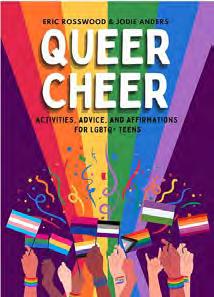


queer teenager seeking a guide to making a difference and having fun while doing so.
and fumbling process” and this book intimately showcases LGBTQ+ relationships by asking each interviewee about the first person each of them recognized as queer.
The “power” in these couples stems from three qualities: “they’re out, they’re coupled, and they’re able to influence mainstream culture.” Spanning gender, race, ethnicity, background, artistic talent, personal experience, and radical histories, these couples, conjoined by their shared excellence in the arts, the sciences, and beyond, are stylistically unique, stunningly photographed, and attention-drawing.
Singer, songwriter, and musician Mike Hadreas and his partner Alan Wyffels discuss how their provocative music group Perfume Genius emerged. They are joined by Pasadena chemist and biologist duo Barbara Belmont and Rochelle Diamond; academic couple Marilee Lindemann and Martha Nell Smith; dynamic producer, director and writer team Ben and Daniel Barnz; and powerhouse authors Charlie Jane Anders (speculative sci-fi) and Annalee Newitz (sci-fi and science journalism) who intimately share how they worked through the issues of a couple in the same field with the same career anxieties to blossom into a “smitten” romance.
This book celebrating influential queer couples gets its power not only from its striking imagery but from the probing, deeply felt interview material as well. Don’t miss these unforgettable portraits.
‘Queer Cheer’ by Eric Rosswood, $19 (Mango Books)
Queer teenagers need to look no further than this guidebook by award-winning author Rosswood and Anders awash in everything that supports, uplifts, advocates, affirms, and proactively identifies LGBTQ youth today. On its glossy full-color pages are conversations on identity, self-care tips, “rainbow affirmations,” motivating, healthy living activities, and a barrage of feel-good habits that will make any teen celebrate who they are and who they will become soon.
Written with humor and honesty, the multimedia artwork and color schematics will never bore a reader and each page screams its message out loud and proud. The importance of navigating spaces and participatory activism for queer freedom and equality movements will not go unnoticed for teen readers who seek community and a way to interact with others in the rainbow networks of art, politics, self-love, and identity. This book is a must-have for any
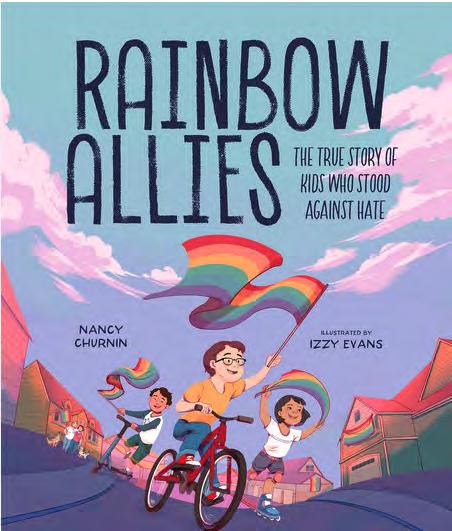
‘Finding my Rainbow: A Journey of Courage, Acceptance, and Pride’ by Josh Coleman, $18.99 (self)
Social justice advocate Coleman has crafted this beautifully colorful 26-page children’s and YA autofiction set in rural Alabama where the author as a young boy (named Josh) grows up and seeks guidance and acceptance from a community he fears will not be so welcoming of his alternative feelings and attractions.
Through his perseverance, disappointments, and ultimate liberation, this book follows the path of others in the children’s genre, but illustrator Shimanto Das’s vibrant graphic artwork is striking throughout and brings each scenario Josh encounters to life with color and big, bold expression. A moving, meaningful story of coming out and coming to terms with oneself, Coleman’s own journey is presented with rich, kaleidoscopic color and an easy-to-read tale of a smalltown boy with big bright lights in his future.
‘Marley’s Pride’ by Joelle Retener, Illus. by DeAnn Wiley, $17.99 (Barefoot)
This 32-page wonder features Marley, a Black transgender child who finds the idea and experience of Pride Month anxiety-inducing. When their grandparent, Zaza, is bestowed with an award for transgender awareness and advocacy, Marley promised to attend the ceremony despite having skipped Pride activities for years prior. It’s all about inclusivity and positivity in this communication-focused story about boundaries, comfort, and selfdiscovery in the face of worry.
‘A Song for Nolan’ by Rushie Ellenwood, Illus. by Sally Chen
$18.99 (Little Bee)
A feather boa and purple suspenders is the outfit of choice for brownskinned, pink-haired nonbinary Nolan, who arrives at a friend’s birthday party at a roller-skating rink. Despite moments of awkwardness that threaten to detail Nolan’s fun, a quick music change and some galvanized group cheer put everyone in the mood to celebrate along with their friend. Artist Chen’s vibrant color saturation is the perfect match for Ellenwood’s story about discovering one’s inner prism and telling the world about it one boa at a time.
‘Rainbow Allies’ by Nancy Churnin, Illus. by Izzy Evans, $18.99 (Beaming)
Based on real events, Churnin’s relevant and affecting children’s book recounts the story of a newly married
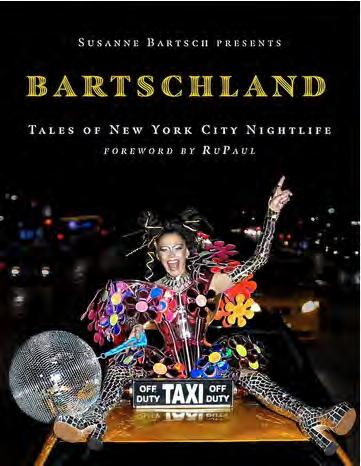
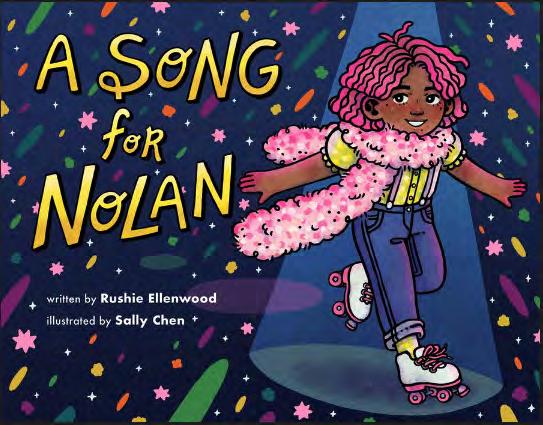
Massachusetts queer couple, Cari and Lauri, who return home to sadly discover their rainbow pride flag stolen and their family home covered with eggs. Coming to their aide are neighbors, specifically a boy named Brendan, who offers encouragement, a replacement flag, and a rallying community spirit event that gathers the township together in solidarity and in the name of celebrating everyone, no matter who they are. This critical message of community, unconditional love, respect, and allyship will resonate particularly during these turbulent times of political and social unrest.
‘Bartschland: Tales of New York City Nightlife’ by Susanne

Bartsch, $40 (Cernunnos/Abrams)
Bartsch, a veteran fixture and event producer on the Manhattan club scene back in the 1980s and ’90s, compiles reflections and photographs into a book that will have readers of a certain age pining for one more spin beneath the giant dance floor mirror ball.
RuPaul provides the foreword section which describes Bartsch as an “amazing connector” of continents, cities, and boroughs, and ideas, energy and people. They’d first met when RuPaul was a gogo dancer at Bartsch’s Tuesday night party called Savage.
The book delves into Bartsch’s Swiss roots where, as a child, she was always “interested in expressing myself through dressing up.” Moving to
London as a teenager only encouraged her to capitalize on this desire and once relocated to New York, the dream of holding court in small, unique, quirky nightclubs and cavernous ballrooms, and fashion show production became her lifestyle and brand name.
The author narrates her history in smooth conversational prose which will make readers really want to be there right alongside her. The book’s glossy, vibrant, stunning, and utterly spectacular photographs of the nightlife creatures who became celebrities and notable Manhattan luminaries are the kind of images one lingers over and imagines being in that very space with folks like Amanda Lepore, Joey Arias, and everyone who followed their own separate “Warhol dreams” to “fulfill the promise of a David Bowie future.”
This disco-era treasury of another world, in another place and time, will resonate with readers who used to dance until dawn, wore eyeliner without remorse or restraint, and, as part of New York City’s glittery Bartschland, were, to Suzanne, “the people I am endlessly blessed to call my chosen family.” This commemorative photograph essay in words and images is worth its weight in gold lamé t
MARIN COUNTY FAIR Make A Splash!
FERIA
DEL CONDADO DE MARÍN
Be proud and join the crowd for Pride Day at the Fair on July 5th! Sport your pride colors and join us for Pride programming throughout the day on the Community Stage from Drag Story Time, The Glam Show, DJ Cisco, and more. Ride the rides, explore the Barnyard, enjoy the fine art and photography exhibits, and stay for Brandy Clark on the Island Stage at 7:30pm followed by fireworks over the Lagoon. EN VOGUE July 3 SPLASHBACK MUSIC FEST July 4 BRANDY CLARK July 5 ZIGGY MARLEY July 6

LONELY BOYS July 7

3-7, 2024 3-7 DE

June 20-26, 2024 • Bay area reporter • 23 t Books >>
MARINFAIR.ORG
JULY
JULIO
¡Hagamos Revuelvo!
<< Pride Books From page 15
LOS

12 noon to 8
Monday to Saturday
11 to 7
Lorem ipsum
Sunday shop deals everyday
Lorem ipsum
Lorem ipsum Lorem ipsum

















































































 by Tim Pfaff
by Tim Pfaff





 by Gregg Shapiro
by Gregg Shapiro


























 by Laura Moreno
by Laura Moreno











